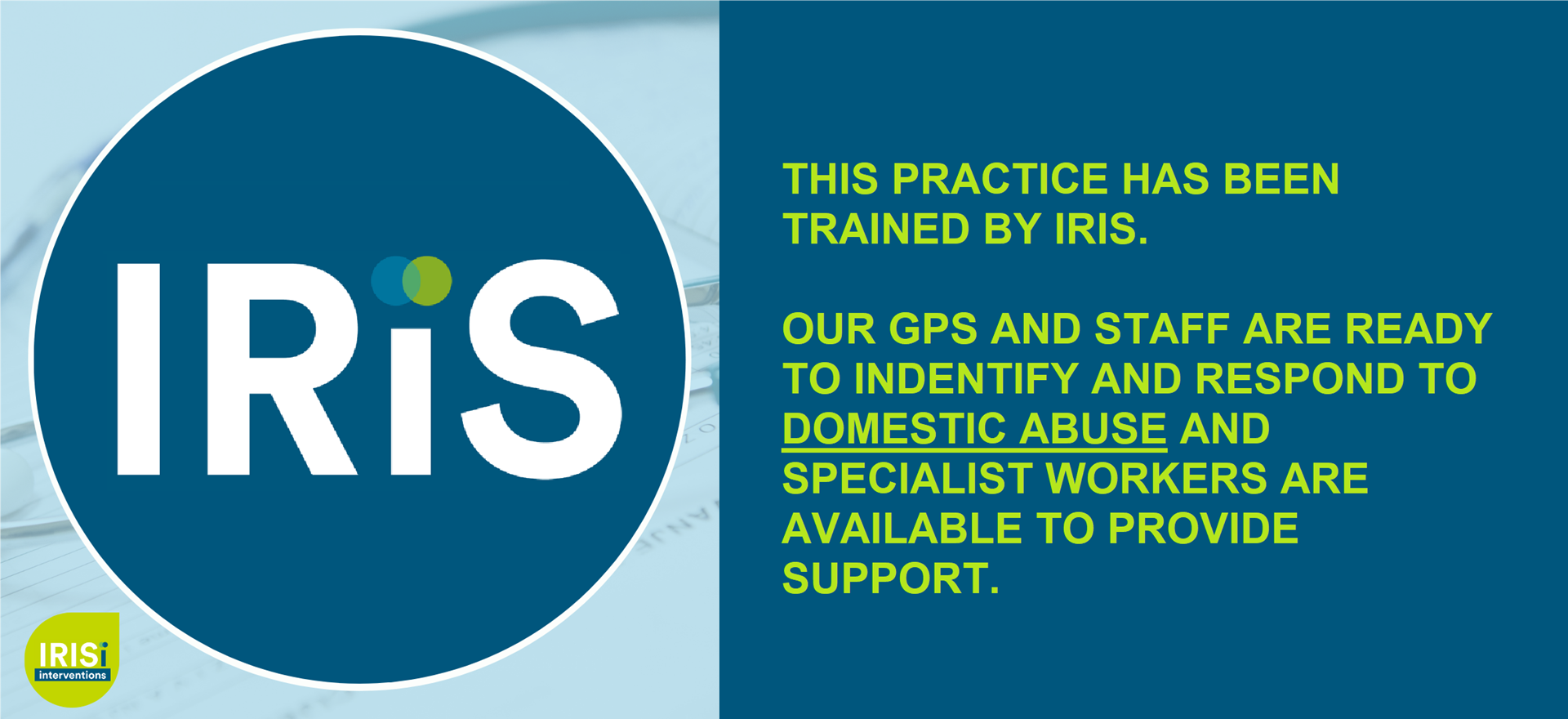News
National No Smoking Day - 11th March 2026
National No Smoking Day is an ideal time to start your journey towards a healthier, smoke-free life. Quitting smoking is one of the best decisions for your health, and the positive effects begin right away:
Breathe Stop Smoking Service is a free Camden & Islington service. Get the support that suits you best to stop smoking, including tips to stop by yourself, personalised help from a specialist advisor online or over the phone, and face-to-face support in Islington (and Camden) throughout your journey to be smoke free.
How to Get Support
Call 020 3633 2609
Visit Breathe – Stop Smoking Service
Download the NHS Smokefree App
Young Carers Action Day - 11th March 2026
Young Carers Action Day is an annual event dedicated to raising awareness about young carers – children and young people who provide unpaid care and support to family members, often due to illness, disability, or other long-term conditions. The day aims to recognise the vital role these young individuals play, highlight the challenges they face, and promote the importance of providing them with the support they need.
The theme for Young Carers Action Day 2026 is ‘Fair Futures for Young Carers’, a call to ensure every young carer has the same chances to learn, grow and thrive as their peers.
Research shows that young carers are much more likely to experience severe psychological distress compared to their peers without caring responsibilities. It’s crucial for them to have time away from their caregiving duties to rest, recharge, and focus on themselves – whether that’s pursuing a hobby or simply spending time with friends, just like others their age.
Young Carers Action Day also highlights the need for education professionals and employers to provide young carers with a break in life. This could involve offering additional support at school, acknowledging that their caregiving duties at home often leave them feeling overwhelmed as they try to balance these responsibilities with their schoolwork. By better understanding these pressures and offering assistance, education professionals can help young carers manage their challenges, giving them the opportunity to succeed both at school and in further and higher education.
If you are a young carer, please let your GP know so we can update our records.
Contact Carers Direct
- Telephone – 0808 802 0202
- Helpline Information – nhs.uk/carersdirect/carerslives/updates/pages/carersdirecthelpline.aspx
- Email – carersdirect@nhschoices.nhs.uk
- Office Hours – Lines are open 8am to 9pm Monday to Friday, 11am to 4pm at weekends. Calls are free from UK landlines.
- ISLINGTON CARERS HUB is there to help. Please call 0800 085 1141(FREEPHONE)
World Kidney Day - 13th March 2026
World Kidney Day (WKD) is an annual global event dedicated to raising awareness about the importance of kidney health, the prevention of kidney disease, and the need for early detection and treatment.
The day aims to educate the public and policymakers about kidney health, kidney disease prevention, and the impact of kidney-related conditions on individuals and communities worldwide.
World Kidney Day also works to combat the rising global incidence of chronic kidney disease (CKD), which can be caused by factors such as diabetes, high blood pressure, and unhealthy lifestyle choices.
To reduce your risk of CKD, it’s important to focus on healthy lifestyle choices and take precautions with certain medications. Here are some key steps you can take:
- Quit Smoking: Smoking can damage blood vessels and reduce blood flow to your kidneys, increasing the risk of CKD. Quitting smoking helps protect your kidneys and improves overall health.
- Reduce Alcohol Intake: Drinking excessive alcohol can lead to high blood pressure and liver damage, both of which can contribute to kidney disease. Moderating your alcohol intake helps protect your kidneys.
- 30 Minutes of Exercise a Day: Regular physical activity helps manage weight, reduces blood pressure, and improves heart health – all factors that can lower your risk of CKD. Aim for at least 30 minutes of moderate exercise most days of the week.
- Staying a Healthy Weight: Being overweight or obese can increase your risk of conditions like diabetes and high blood pressure, which in turn can lead to kidney damage. Maintaining a healthy weight through a balanced diet and regular exercise can reduce your risk.
- Be Cautious with Anti-inflammatory Drugs (e.g., Ibuprofen): Long-term or excessive use of non-steroidal anti-inflammatory drugs (NSAIDs), like ibuprofen, can damage the kidneys. These drugs should be used cautiously, especially in people with existing kidney problems or conditions like high blood pressure or diabetes.
In addition to these, it’s important to regularly monitor kidney function if you have risk factors like diabetes, high blood pressure, or a family history of kidney disease. Early detection and treatment can help prevent CKD from progressing.
National HIV Testing Week – 9-15th February 2026
National HIV Testing Week is an annual initiative by HIV Prevention England that highlights the importance of regular HIV testing. The campaign aims to reduce the number of undiagnosed HIV cases and those diagnosed late.
The UK government’s target is to eliminate HIV transmissions and HIV-related stigma by 2030. How can we make this happen?
Free HIV testing is simple and quick – just a finger-prick. Regular testing is essential because HIV can go undetected for years without symptoms. The only way to know your HIV status is to get tested. Early detection allows individuals to begin treatment, stay healthy, and prevent transmission to others.
You can visit the Sexual Health London website to order a free home testing kit.
You can also speak to our staff in your local sexual health service, or your GP.
Who should get tested?
- It’s recommended for everyone who is sexually active to get tested for HIV and other STIs at least once a year, even if there’s no obvious risk. If someone has multiple sexual partners, they should consider testing more frequently.
- Gay, bisexual, and other men who have sex with men (GBMSM) should get tested regularly for HIV and STIs, at least once a year, or every three months if having unprotected sex with new or casual partners.
- Black African men and women should have routine HIV and STI screenings if engaging in unprotected sex with new or casual partners.
- Trans men and trans women who have sex with men should test for HIV and other STIs regularly, either annually or every three months if having unprotected sex with new or casual partners.
How to protect yourself from HIV:
- The most effective ways to protect against HIV are using condoms and taking PrEP (pre-exposure prophylaxis). PrEP is a highly effective medication for those at risk of HIV, and when taken as directed, it helps prevent HIV transmission. For more information, click [here](opens link).
- PEP (post-exposure prophylaxis) is a treatment that can prevent HIV if taken within 72 hours after potential exposure to the virus. It’s available through sexual health services.
Our local sexual health clinic is:
Archway Sexual Health Clinic
681-689 Holloway Road
Archway
London
N19 5SE
Eating Disorders Awareness Week – 23rd February – 1st March 2026
Eating Disorders Awareness Week is a national campaign led by Beat, the UK’s eating disorder charity. It focuses on encouraging UK medical schools to introduce comprehensive eating disorder training.
Eating disorders can develop for many complex reasons. They occur when a person has a negative relationship with food and their body, which seriously affects their life.
These disorders may involve overeating or undereating, with a strong preoccupation with weight and body image, causing significant distress.
Eating disorders can affect anyone, regardless of gender, age, ethnicity, sexuality, or background. The good news is that treatment is available, and it’s important to reach out for support and advice from Beat or a GP by submitting an online consultation. Recovery is possible, though it’s a journey that looks different for everyone.
Practice Christmas Opening Hours - 2025/26
- Wednesday 24th December – Practice is open 8am – 6:30pm
- Christmas Day – Practice is Closed and no extended hours
- Friday 26th December (Boxing Day) – Practice is Closed – Extended hours phone lines are open 8am – 8pm
- Saturday 27th December – Extended hours phone lines are open 8am – 5pm
- Sunday 28th December – Extended hours phone lines are open 8am – 5pm
- Monday 29th December – Practice is open 8am – 6:30pm (Extended hours phone lines are open 6:30pm – 8pm)
- Tuesday 30th December – Practice is open 8am – 6:30pm (Extended hours phone lines are open 6:30pm – 8pm)
- Wednesday 31st December – Practice is open 8am – 6:30pm (Extended hours phone lines are open 6:30pm – 8pm)
- Thursday 1st January (New Year’s Day) – Practice is Closed – Extended hours phone lines are open 8am – 8pm
- Friday 2nd January – Practice is open 8am – 6:30pm (Extended hours phone lines are open 6:30pm – 8pm)
We would like to remind patients of the Pharmacy First Service available as a walk-in service from community pharmacies for the following conditions:
- impetigo (aged 1 year and over)
- infected insect bites (aged 1 year and over)
- earache (aged 1 to 17 years)
- sore throat (aged 5 years and over)
- sinusitis (aged 12 years and over)
- urinary tract infections (UTIs) (women aged 16 to 64 years)
- shingles (aged 18 years and over)
More help and support for a wider range of conditions is also available from NHS 111 and 111 Online.
Dry January 2026
The Dry January challenge, created by Alcohol Change UK, sees hundreds of thousands of people across the UK go alcohol - free for the month of January, using the tools and resources provided by Alcohol Change UK, including Try Dry (the official app of the Dry January challenge), daily motivational emails, and an active online community
According to Alcohol Change UK, more than 15 million people in the UK planned an alcohol-free month in January 2025, motivated by the opportunity to improve their health, wellbeing and finances. Further research1 suggests that 8 million people attempted a full 31 days off while a further 8.8 million cut down, confirming that the New Year remains a time when many look to kick-start positive changes in their lives.
Why encourage people to sign up?
When people take part with Alcohol Change UK, they get access to a host of dedicated tools to help them stay alcohol - free for the whole month, and to reduce their drinking longer term. Evidence shows those who take part in the Dry January ® challenge using Alcohol Change UK’s tools and resources double their chance of having a completely alcohol - free month and have significantly improved wellbeing and lower alcohol health risks six months later.
You can download the “Try Dry” app here, to help with your Dry January efforts:
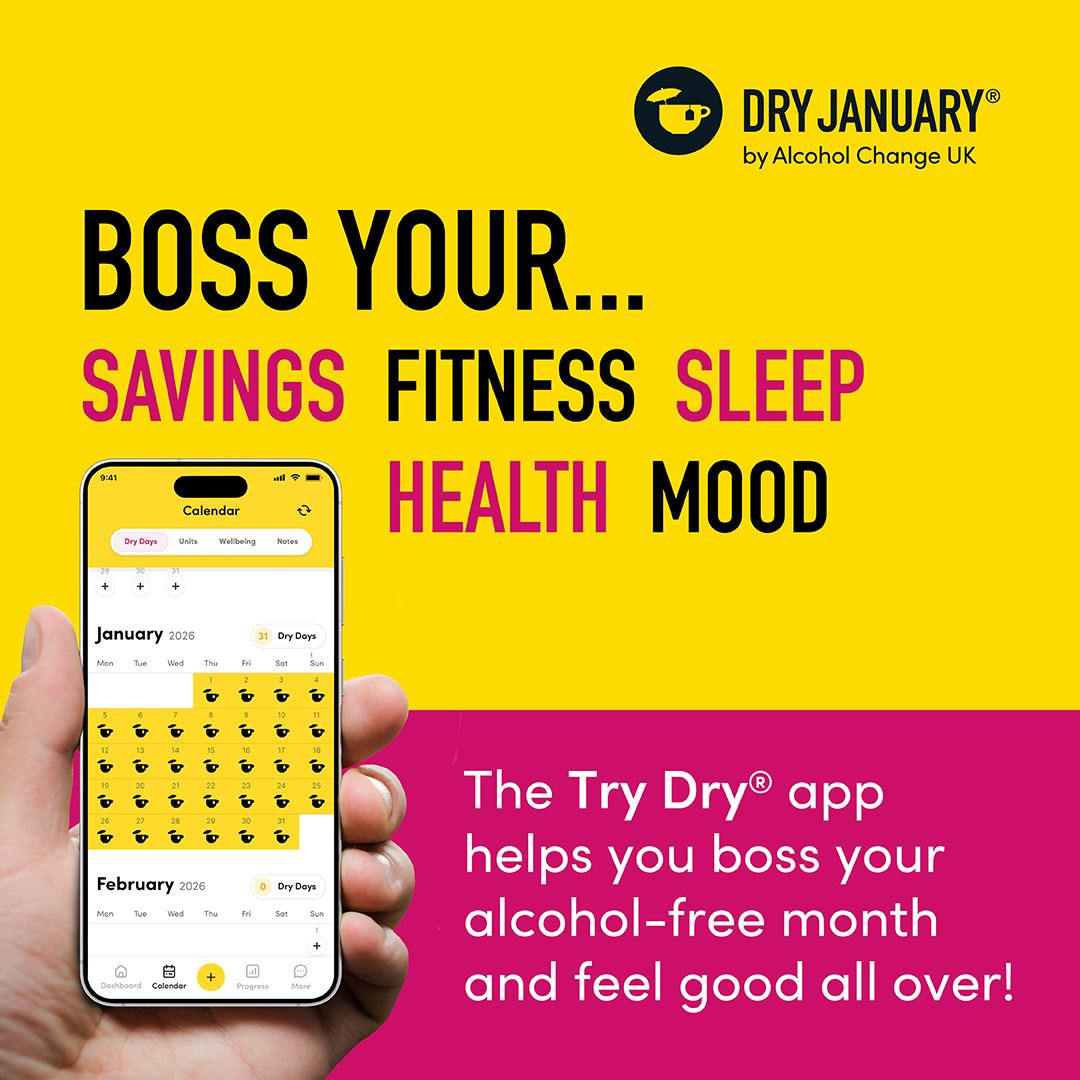
Cervical Cancer Prevention Week – 22nd-28th January 2026
Cervical Cancer Prevention Week is an annual campaign aimed at educating people about cervical cancer, the importance of regular screenings and methods of prevention. Cervical cancer is a largely preventable disease, and this week serves as a reminder to prioritise cervical health and take steps to reduce the risk of this cancer.
Cervical Screening
What is ‘cervical screening’?
Cervical screening (previously known as a ‘smear test’) is a free health test available on the NHS which checks the health of your cervix (the lower part of the uterus that connects to the vagina) and helps you find any abnormal changes before they can turn into cancer.
The purpose of cervical screening is to identify any early signs of cervical cancer or precancerous changes. Detecting these abnormalities early allows for timely treatment, which can prevent the development of cervical cancer.
Who is invited for a cervical screening?
Those aged between 25-64 with a cervix. Women are usually born with a cervix. Trans men, non-binary and intersex people may also have one, and would therefore be eligible for a screening test.
You’ll be invited for screening every 5 years from when you’re 25 to 64 years old. You’ll get your first invitation a few months before you turn 25.
Why is it important?
Along with the HPV vaccine, cervical screening is the best way to protect against cervical cancer and prevents over 70% of diagnoses.
HPV Vaccination
The NHS HPV vaccination programme in England has dramatically lowered HPV infections and rates of cervical cancer in vaccine-eligible women, with the strongest effects seen in those offered vaccination at younger ages.
The HPV Vaccination is provided in schools around the age of 13. This year, the NHS is conducting an HPV catch-up campaign. If you are aged between 16-24yrs and have not had an HPV vaccination, please contact your GP practice to book.
Parent Mental Health Day - 30th January 2026
Parent Mental Health Day (PMHD) is held each year on 30th January. The day was created by Stem4 to raise awareness of the link between parents’ and carers’ mental health and the wellbeing of the whole family.
While PMHD remains an important moment in the calendar, the challenges parents and carers face are year-round.
Stem4 has a number of useful resources on their website that you can access for free:
- Understanding Anxiety in Young People
- Understanding Depression in Young People
- Understanding Self-Harm in Young People
- Understanding Eating Disorders in Young People
- Understanding Addiction in Young People
The following services for young people are also available to residents of Islington:
Lift Islington Social Prescribing Team
For young people who are feeling low or stressed and feel that trying new activities or tackling worries with the help of a supportive person might make the difference, contact the children and young people’s (age 11-25) social prescribing team at Lift www.liftislington.org.uk/events/social-prescribing-team
Kooth
Kooth is a free online counselling and emotional well-being support service for young people. It is a safe, secure and anonymous means of accessing support with their emotional health and wellbeing needs from a professional team of qualified counsellors. Visit Kooth.com
In Our Place (Online Course)
Help teenagers to understand their feelings better. There’s a free NHS approved online course specifically for teenagers at www.inourplace.co.uk. Find the course called Understanding your feelings (for teenagers only!) at Understanding your feelings (for teenagers only!) – inourplace | Solihull Approach and enter the free access code Bright Start
The Waiting Room
The NHS Waiting Room Welcome to the Waiting Room is packed with information, resources and toolkits to support good mental health and wellbeing and links to services. Sign-in for access to everything on offer.
The Waiting Room also contains specific useful information for Neurodivergent families – you can find out more by accessing the website here.
Lung Cancer Awareness Month
The month of November is Lung Cancer Awareness Month.
Lung cancer is one of the most common and serious types of cancer. More than 43,000 people are diagnosed with the condition every year in the UK.
There are usually no signs or symptoms in the early stages of lung cancer, but many people with the condition eventually develop symptoms including:
- a persistent cough
- coughing up blood
- persistent breathlessness
- unexplained tiredness and weight loss
- an ache or pain when breathing or coughing
You should see a GP if you have these symptoms.
Early detection of Lung Cancer can greatly improve the effectiveness of treatment. The North Central London Cancer Alliance has offered free Lung Health Checks in the borough since 2022.
Lung Cancer Screening is offered to local residents between the ages of 55 and 74 who smoke or used to smoke.
You can find out more about the programme here: https://www.nclcanceralliance.nhs.uk/our-work/prevention-awareness-and-screening/lung-cancer-screening/
Malnutrition Awareness Week: 17th – 23rd November 2025
Over three million people in the UK are either malnourished, or at risk of malnutrition. There are many factors contributing to this statistic – the rising cost of living, food and energy prices, social isolation.
Malnutrition is both a cause and consequence of illness – often a hidden problem it can go unnoticed.
Malnutrition Awareness Week is a campaign run by The British Association for Parenteral and Enteral Nutrition (BAPEN) aimed at raising awareness of malnutrition, and work to advance the nutritional care of patients and those at risk from malnutrition in the wider community.
Malnutrition is a serious condition that happens when your diet does not contain the right amount of nutrients.
It means "poor nutrition" and can refer to:
- undernutrition – not getting enough nutrients
- overnutrition – getting more nutrients than needed
You can find out more on the NHS website here.
International Stress Awareness Week: 3rd-7th November 2025
International Stress Awareness Week is an annual campaign organised by the International Stress Management Association (ISMAUK) to raise awareness about stress and its impact on mental and physical health. The campaign encourages open conversations about stress and mental health, and the importance of stress management.
Most people feel stressed sometimes and some people find stress helpful or even motivating. But if stress is affecting your life, there are things you can try that may help.
Support is also available if you're finding it hard to cope with stress. You can find out more here: https://www.nhs.uk/mental-health/feelings-symptoms-behaviours/feelings-and-symptoms/stress/
Symptoms of stress
Stress can cause many different symptoms. It might affect how you feel physically, mentally and also how you behave.
It's not always easy to recognise when stress is the reason you're feeling or acting differently.
Physical symptoms
- headaches or dizziness
- muscle tension or pain
- stomach problems
- chest pain or a faster heartbeat
- sexual problems
Mental symptoms
- difficulty concentrating
- struggling to make decisions
- feeling overwhelmed
- constantly worrying
- being forgetful
Starting in October 2025
Dear Patients,
As part of national NHS England changes approaching, all appointment requests and administrative enquiries at our practice will now need to be submitted via our online system, Starting in October, eConsult. This includes: Urgent (same-day) medical needs Routine appointments Follow-ups Administrative requests (such as fit notes, test results, etc.)
This new system allows us to assess your needs more efficiently, get you seen quicker, and reduce waiting times for both appointments and phone calls.
🖥️ How to access eConsult: You can find the eConsult link on our practice website, and it will be available to use during our opening hours.
📞 Need help? If you’re unable to access eConsult yourself, please call our reception team. They’ll be happy to complete it on your behalf. To help us help you, please be prepared to answer a few short questions — this information will be passed on to our triage team to ensure your enquiry is prioritised appropriately.
💡 Why the change? We’ve already been trialling this process over the last few months and have seen great results — including quicker access to clinicians and shorter phone queues. Patient feedback has been really positive, and we’re excited to now make this our standard process.
If you have any questions, please don’t hesitate to contact our reception team.
Thank you for your understanding and support.
Kind Regards,
Dr Neelesh & Tamara Bowry
World Menopause Day – 18th October 2025
World Menopause Day is held annually on 18th October, and aims to raise awareness of the menopause, as well as the support available to improve wellbeing.
Historically, menopause had not been studied as much as it should have, and the condition was not discussed openly. World Menopause Day was seen as a solution to these problems by encouraging conversation and research on menopause and its effects.
What is Menopause?
Menopause is when your periods stop due to lower hormone levels. It usually affects women between the ages of 45 and 55, but it can happen earlier. It affects anyone who has periods.
Menopause can happen naturally, or for reasons such as surgery to remove the ovaries (oophorectomy) or the uterus (hysterectomy), cancer treatments like chemotherapy, or a genetic reason. Sometimes the reason is unknown.
Perimenopause is when you have symptoms of menopause but your periods have not stopped. Perimenopause ends and you reach menopause when you have not had a period for 12 months.
Menopause and perimenopause can cause symptoms like:
- Anxiety
- Mood swings
- Brain fog
- Hot flushes
- Irregular periods.
These symptoms can start years before your periods stop and carry on afterwards.
Find out more here: https://www.nhs.uk/conditions/menopause/
World Mental Health Day – 10th October 2025
World Mental Health Day happens every year on 10th October, and aims to create an opportunity to talk about mental health, as well as raise awareness of people suffering from mental health problems.
This year’s theme set by the World Federation for Mental Health is ‘Access to Services’ – mental health in catastrophes and emergencies. The theme highlights the importance of people being able to protect their mental health whatever they’re going through, because everyone deserves good mental health.
Talking about Mental Health
World Mental Health Day is a great opportunity for us to come together to talk about mental health and show everyone that is matter. The information below from the Mental Health Foundation sets out some helpful tips as well as what to expect.
1. Choose someone you trust to talk to
This might be a friend, family member or a colleague. Or you might be more comfortable talking to someone you don’t know, for example, through a support helpline. It can help to do a pros and cons list about talking to someone.
2. Think about the best place to talk
It’s important to choose a place where you feel comfortable enough to open-up. You might want to choose somewhere private where you’re less likely to be disturbed. You also might want to talk while you do an activity, like walking together.
3. Prepare yourself for their reaction
Hopefully, you will have a good experience when you open-up to someone. But there’s a chance that they may not react in the way you hope. This may be for different reasons, like they may be worried or not fully understand at first. If that’s the case, try to give them time to process what you’ve told them. It might help to give them information to read to help them understand. And don’t forget to be kind to yourself and practise self-care.
Who can I contact if me or someone I know is suffering from mental health problems?
There are a wide range of mental health services available in Islington. Please click here to access the Directory of Services
Stoptober 2025
What is Stoptober?
Every October, the Department for Health and Social Care runs ‘Stoptober’, an annual mass participation stop smoking campaign.
The goal is simple: to encourage the remaining 5.3 million smokers in England to quit for good, by showing that they don’t need to quit on their own.
Why it matters
Smoking is still a significant issue:
- Smoking remains the single biggest cause of preventable ill health and death.
- Smoking is estimated to cost society £21.3 billion per year in England. This includes an annual £18 billion loss to productivity through smoking-related lost earnings, unemployment, and early death.
- 230,000 households live in smoking-induced poverty.
- Smoking is estimated to cost the NHS and social care £3 billion per year, resources that could be freed up to deliver millions more appointments, scans, and operations.
- Using willpower alone remains the most common approach to quitting smoking. This is in spite of the fact it’s been proven to be the least effective.
Join thousands of other smokers committing to quit this October!
- Quitting smoking is the best thing you can do for your health. When you stop you’ll experience health benefits almost immediately.
- Stop smoking for the 28 days of Stoptober and you’re five times more likely to quit for good.
- It’s never too late to quit smoking. Even if you’ve tried quitting before, give it another go this Stoptober.
- NHS Better Health offers a range of free quitting support. This includes the NHS Quit Smoking app, a personal quit plan tool, help to find a local stop smoking service and advice on quitting techniques such as switching to vapes.
Want to know more? Click here to visit the NHS website for more guidance.

Flu Vaccination Campaign 2025
We will soon be entering flu season! The NHS recommends that you get your free flu vaccination if you are eligible (please see further information on eligibility below).
- Flu vaccinations for Children aged 2-3 years, and for those who are pregnant will be available at your GP practice from 1st September 2025.
- Flu vaccinations for everyone else eligible will be available at your GP practice from 1st October 2025.
Your GP practice will contact you using your preferred method of communication as soon as the vaccines are delivered and you are able to book your appointment. This may be a self-booking link via text message, allowing you to book your vaccination appointment yourself.
Adult Flu Vaccination
The flu vaccine is recommended for people at higher risk of getting seriously ill from flu.
It’s offered on the NHS every year in autumn or early winter.
You can get the free NHS flu vaccine if you:
- Are aged 65 or over
- Have certain long-term health conditions
- Live in a care home
- Are the main carer for an older or disabled person, or receive a carer’s allowance
- Live with someone who has a weakened immune system
Frontline health and social care workers can also get a flu vaccine through their employer.
The flu vaccine is recommended for people with certain long-term health conditions, including:
- Conditions that affect your breathing, such as asthma (needing a steroid inhaler or tablets), chronic obstructive pulmonary disease (COPD) or cystic fibrosis
- Heart conditions, such as coronary heart disease or heart failure
- Chronic kidney disease
- Liver disease, such as cirrhosis or hepatitis
- Some conditions that affect your brain or nerves, such as Parkinson’s disease, motor neurone disease, multiple sclerosis or cerebral palsy
- Diabetes or Addison’s disease
- A weakened immune system due to a condition such as HIV or AIDS, or due to a treatment such as chemotherapy or steroid medicine
- Problems with your spleen, such as sickle cell disease, or if you’ve had your spleen removed
- A learning disability
- Being very overweight – a body mass index (BMI) of 40 or above
If you’re unsure whether you are eligible for the flu vaccine, please call your GP surgery and speak to the reception.
For more information about the adult flu vaccination, please click here.
Children’s Flu Vaccination
Flu vaccinations are offered to:
- Children aged 2 or 3 years (through your GP practice)
- Children aged 6 months to 17 years with certain long-term health conditions (through your GP practice or Hospital department)
- School-aged children, Reception to Year 11 (through your school)
It’s important for children with certain long-term health conditions to have the flu vaccine every year.
This includes children aged 6 months to 17 years who have:
- Conditions that affect their breathing, such as asthma (needing a steroid inhaler or tablets) or cystic fibrosis
- Had a lung or airways infection in the past that meant they needed to stay overnight in hospital
- Serious heart conditions
- Kidney or liver disease
- Some conditions that affect their brain or nerves, such as cerebral palsy
- Diabetes
- A weakened immune system due to a condition or treatment, such as HIV or AIDS, chemotherapy or steroid medicine
- Problems with their spleen, such as sickle cell disease, or if they’ve had their spleen removed
- A learning disability
If you’re unsure whether you or your child are eligible for the flu vaccine, please call your GP surgery and speak to the reception.
For more information about childhood flu vaccinations, please click here.
Want to know more?
Vaccination UK is hosting two free webinars for parents of school aged children in September.
Please see below details and access links:
17th September, 20:00 - 21:00: FREE PARENT WEBINAR: The flu vaccine in children and young people | Vukschools
18th September, 18:00 - 19:00: FREE PARENT WEBINAR: The flu vaccine in children and young people | Vukschools
Topics covered: why does my child need the vaccine, side effects and safety, nasal vs. injection (pork gelatine content), flu data from previous years and a Q&A session.
Flu Vaccination in Pregnancy
It’s recommended that all pregnant women have the flu vaccine, whatever stage of pregnancy they’re at. It’s free for pregnant women.
For more information about the flu vaccination in pregnancy, please click here.
Migraine Awareness Week: 22nd-28th September 2025
Migraine Awareness Week is run by The Migraine Trust, and aims to increase awareness and understanding of migraine, promote research into the condition, and campaign for national policy change to improve the lives of people who get it.
One in seven people in the UK live with migraine, and this complex and debilitating neurological disorder significantly affects their lives.
A migraine tends to be a very bad headache with a throbbing pain on 1 side of the head.
You may get other symptoms just before a migraine, such as:
- feeling very tired and yawning a lot
- craving certain foods or feeling thirsty
- changes in your mood
- a stiff neck
- peeing more
You may also get warning signs you’re about to have a migraine (called an aura), such as:
- problems with your sight, such as seeing zigzag lines or flashing lights
- numbness or a tingling that feels like pins and needles
- feeling dizzy
- difficulty speaking
Aura symptoms should not last for longer than an hour.
Migraines usually last between 2 hours and 3 days, with some symptoms (such as feeling very tired) starting up to 2 days before the head pain starts and finishing after the headache stops.
Some people have migraines several times a week, while others do not have them very often.
The Migraine Trust website has a wealth of resources and information about living with migraine, including tips on self-management and where to access support. You can find out more here.
More about Migraine Awareness Week here.
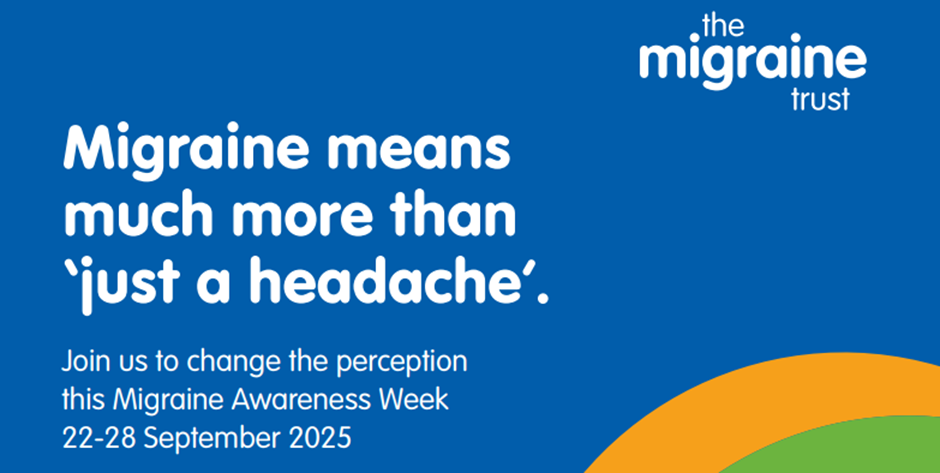
Organ Donation Week: 22nd-28th September 2025
Organ Donation Week is an annual event run by the NHS dedicated to raising awareness about the importance of organ donation and encouraging people to discuss organ donation with their loved ones, and make an informed decision about donating their organs after death.
The week aims to highlight the life-saving impact of organ donation and to increase the number of people on the organ donor register. By sharing stories of those who have been saved by organ transplants Organ Donation Week aims to inspire more people to consider becoming organ donors.
This year for Organ Donation Week, in memory of more than 400 people who died last year waiting for an organ transplant, and for the 8000 people currently on the transplant waiting list, the NHS is campaigning to light up as many local buildings and landmarks across the country in pink. The hope is to remind people of the importance of, and need for, organ donors, as well as to remind people to confirm their decision on the NHS Organ Donor Register.
If you are interested in signing up to be an organ donor, please follow this link.
You can also contact your GP practice should you be interested in exploring organ donation more.
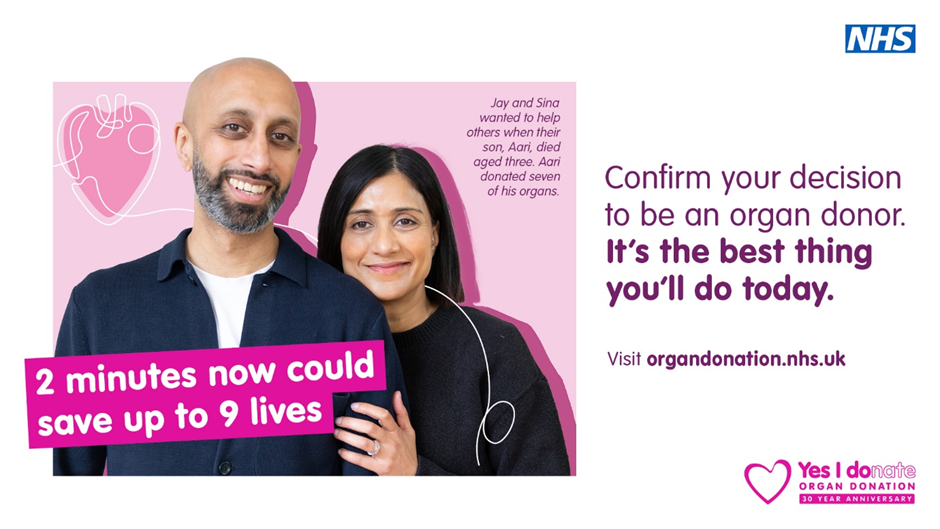
Macmillan Coffee Morning: 26th September 2025
Macmillan Coffee Morning happens annually on the last Friday of September and is based on the simple premise that guests gather over coffee and donate the cost of their drink to Macmillan.
There are nearly 3.5 million people living with cancer in the UK and donations help Macmillan provide them with a number of useful services, including one-on-one nursing and emotional care, and tailored financial advice. The event also aims to foster community, support, and solidarity at a time when people need it most.
Click here to find out about Coffee mornings planned near you!

Know your Numbers Week (Blood Pressure): 8th-14th September 2025
Every September, blood pressure checks are taken by thousands to prevent heart attacks and strokes.
Around 5 million adults aged 18–64 in the UK could be living with undiagnosed high blood pressure – a major risk factor for stroke, heart attack, kidney disease, and early death. Often called the ‘silent killer’, high blood pressure has no symptoms, yet it is the single biggest preventable cause of death in the UK.
Know your Numbers Week aims to reach those who have high blood pressure but are not aware, so that they can get the support they need to bring it under control.
High blood pressure is very common, especially in older adults. There are usually no symptoms, so you may not realise you have it.
Things that increase your chances of having high blood pressure include:
- Your age – you’re more likely to get high blood pressure as you get older
- Having close relatives with high blood pressure
- Your ethnicity – you’re at higher risk if you have a Black African, Black Caribbean or South Asian ethnic background
- Having an unhealthy diet – especially a diet that’s high in salt
- Being overweight
- Smoking
- Drinking too much alcohol
- Feeling stressed over a long period
Get your blood pressure checked at a pharmacy or GP surgery if:
- You think you might have high blood pressure or might be at risk of having high blood pressure
- You’re aged 40 or over and have not had your blood pressure checked for more than 5 years
Some pharmacies may charge for a blood pressure check.
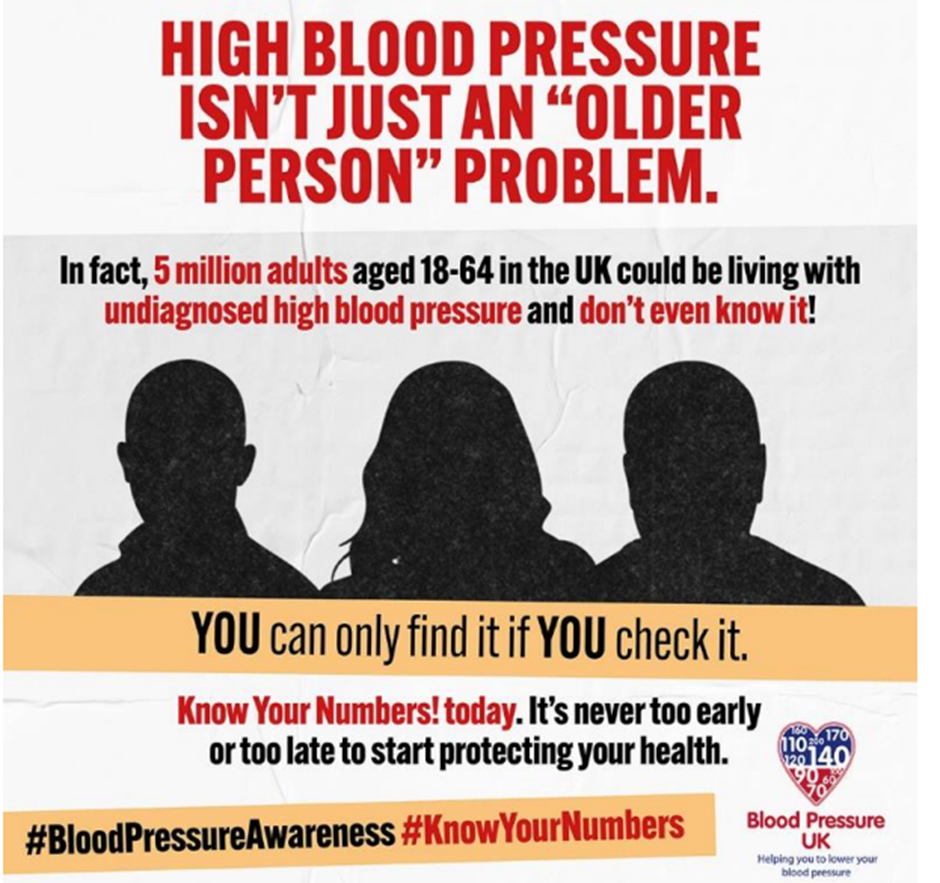
Emotional and Mental Health support for Young People over the Summer Holidays
Lift Islington Social Prescribing Team
For young people who are feeling low or stressed and feel that trying new activities or tackling worries with the help of a supportive person might make the difference, contact the children and young people’s (age 11-25) social prescribing team at Lift www.liftislington.org.uk/events/social-prescribing-team
Kooth
Kooth is a free online counselling and emotional well-being support service for young people. It is a safe, secure and anonymous means of accessing support with their emotional health and wellbeing needs from a professional team of qualified counsellors. Visit Kooth.com
In Our Place (Online Course)
Help teenagers to understand their feelings better. There’s a free NHS approved online course specifically for teenagers at www.inourplace.co.uk. Find the course called Understanding your feelings (for teenagers only!) at Understanding your feelings (for teenagers only!) – inourplace | Solihull Approach and enter the free access code Bright Start
The Waiting Room
The NHS Waiting Room Welcome to the Waiting Room is packed with information, resources and toolkits to support good mental health and wellbeing and links to services. Sign-in for access to everything on offer.
For access to Mental Health services in the borough, please see the below information:
- Families can access young people’s social and emotional wellbeing services (including CAMHS) for mental health support through the Islington Social and Emotional Mental Health Duty line on 020 7527 3355 (Monday to Friday, 9am to 5pm).
- For support in a mental health crisis, children, young people, & families in North Central London can call the mental health support line on 0800 151 0023, open 24/7.
Measles Prevention
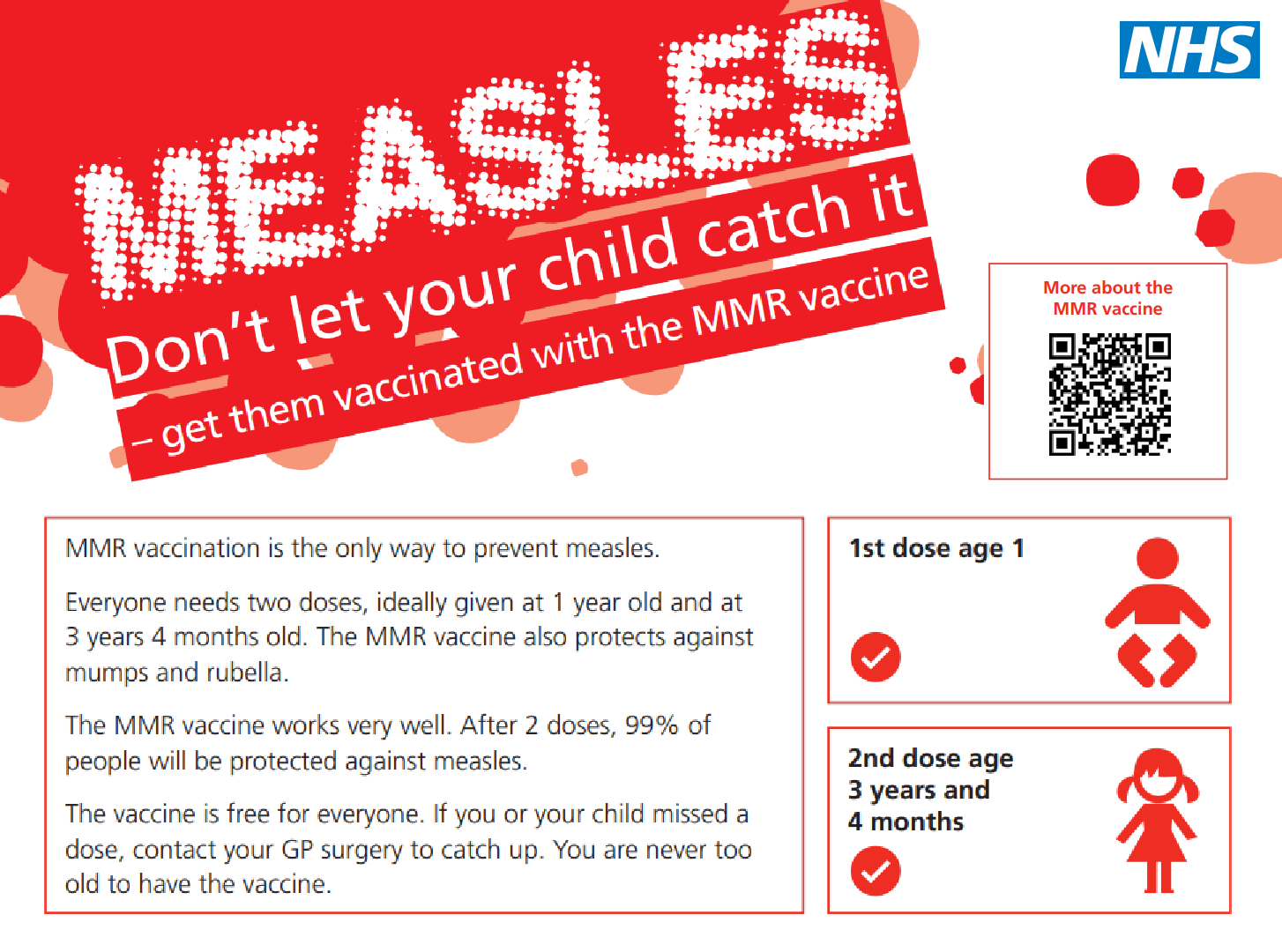
The MMR vaccination prevents three diseases:
- Measles is a highly infectious viral disease which can lead to serious complications such as pneumonia and encephalitis (inflammation of the brain).
- Mumps can cause a wide range of complications, some very serious, including meningitis and encephalitis (inflammation of the brain).
- Rubella (or German measles) is very dangerous for pregnant women because it can cause miscarriage or serious abnormalities in the unborn baby.
The MMR vaccine should be given at 12 months of age and then again at 3 years 4 months of age. One vaccine results in over 90% protection for your child and having both vaccines means that it is almost impossible for your child to get measles.
Unfortunately, we are now seeing an increasing number of cases of measles in the UK and across Europe. This has resulted in severe illness and even deaths in a number of adults and children.
Even if you think your child will be protected by herd immunity (other people being vaccinated around them), this is no longer the case with MMR because less than the required 95% of the population are being vaccinated.
Measles is highly infectious and is spread by aerosolised particles and droplets coughed or sneezed by infected individuals.
Heatwave Information - Islington Cool Spaces
Below is a list of cool spaces in the borough of Islington that you can attend for free to escape the hot weather:
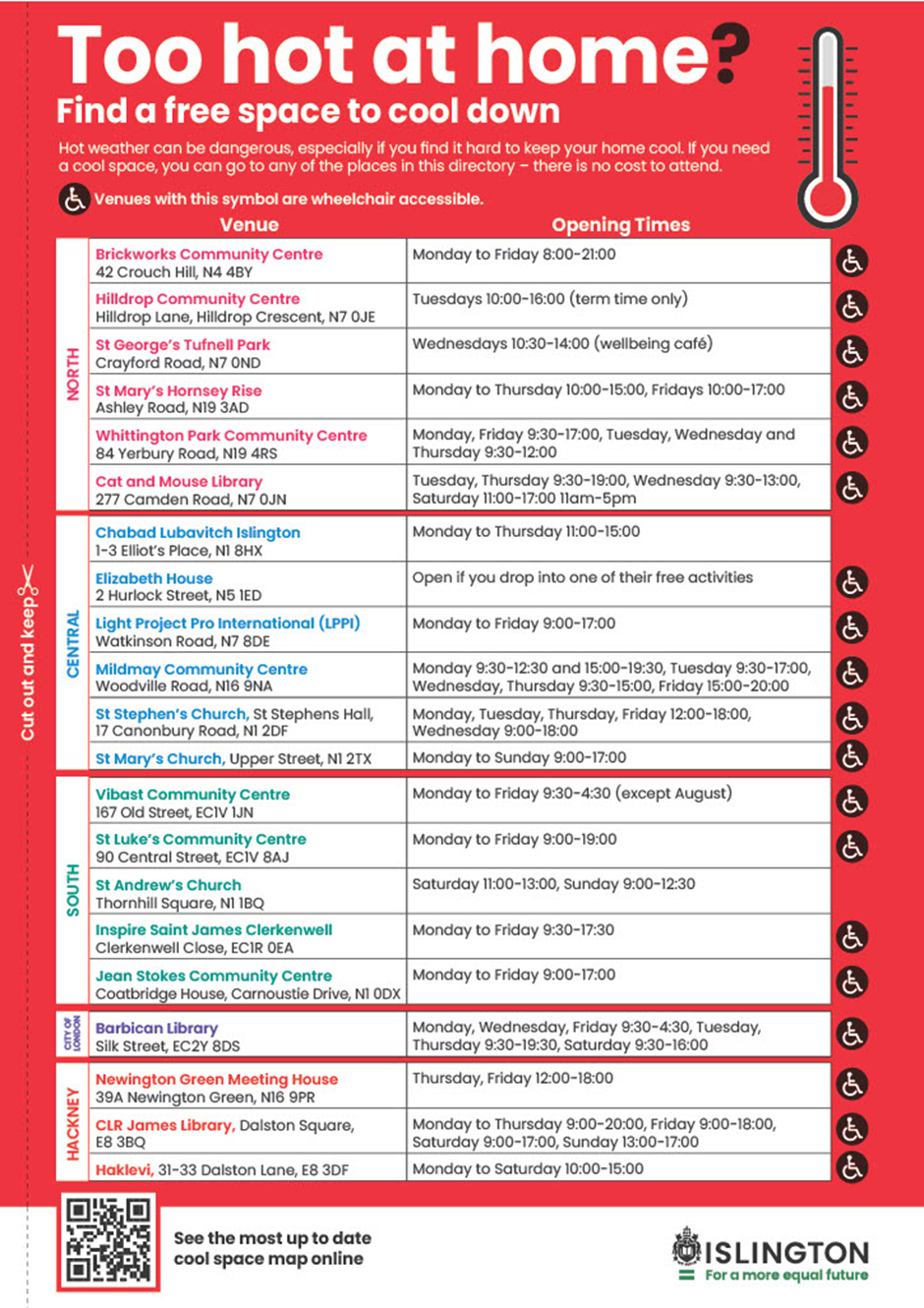
International Overdose Awareness Day: 31st August 2025
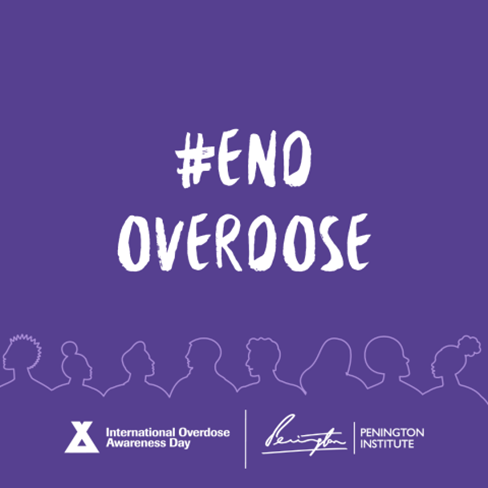
International Overdose Awareness Day takes place annually on 31st August. The campaign strives to stop drug-related overdose and the stigma that might make it difficult for people who need treatment to get help. It is also a chance to remember those who we’ve lost to drug overdose, and listen to the experiences of families and friends left behind.
What is an Overdose?
An overdose can happen when someone has a toxic amount of substance/substances in their body. It is possible to overdose on a number of different substances, including alcohol, illicit drugs, or prescribed medication.
What to do if you think someone has overdosed.
The following advice by NHS Addictions Provider Alliance indicates what to look for, and what you should do, in the event of an overdose.
When should you be concerned someone is having an overdose?
Signs and symptoms of an overdose will vary depending on the type and amount of drug that has been taken, as well as the person’s overall health at the time of taking the drug.
However, if you are concerned about the person’s wellbeing, you should always call 999 for an ambulance to attend. An overdose is always a medical emergency.
You should be concerned and phone an ambulance if they show any of these signs:
- Are unconscious or extremely drowsy
- Are having a seizure
- Seem asleep but are difficult to wake up.
- Are snoring and or/gurgling. This could be a sign that their airways are obstructed and they are struggling to breathe, in this context put them into the recovery position.
- Have a severe headache or chest pain
- Are extremely paranoid, agitated, panicked or confused
- Are overheated and dehydrated
- Are having difficulty breathing
In the case of an opioid overdose, a Naloxone kit is a key tool which can help save lives. However, even if you have used Naloxone and the person’s condition is improving, still phone 999 so an ambulance can attend. Naloxone has a shorter working period than the original opioid that was taken, so it is still possible for the person to overdose again once the Naloxone has worn off. Find out more about Naloxone.
World Breastfeeding Week: 1st -7th August 2025
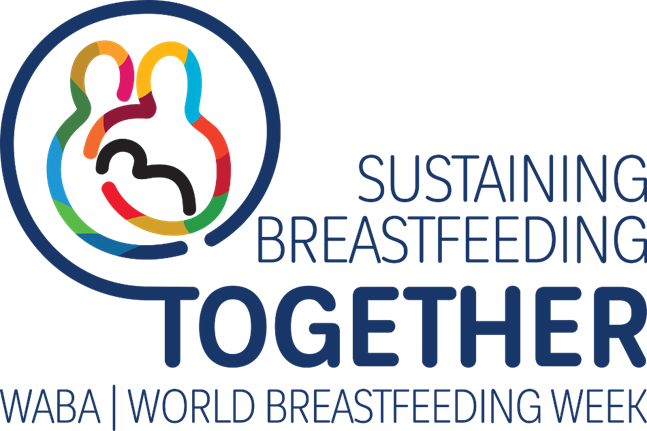
Breastfeeding is one of the most effective ways to ensure child health and survival and yet currently, fewer than half of infants under 6 months old are exclusively breastfed worldwide.
World Breastfeeding Week is celebrated annually from 1st August to 7th August. This global campaign, organised by the World Alliance for Breastfeeding Action (WABA), is aimed at raising awareness about the benefits of breastfeeding for both infants and mothers, while also highlighting the importance of support for breastfeeding mothers.
Breastfeeding has many benefits for both mother and baby:
- Protection for babies against gastrointestinal infections.
- Supplying a vital source of energy and nutrients – breast milk can provide more than half of a child’s energy needs between the ages of 6 and 12 months, and one third of energy needs between 12 and 24 months.
- Research has shown that children and adolescents who were breast-fed as babies are less likely to become obese (cit.).
- Longer durations of breast feeding have been found to reduce the risk of breast cancer in mothers (cit.).
NHS Cervical Screening Programme: Changes from 1st July 2025
What is changing?
At the moment in England, women and people with a cervix aged 25-49 years are routinely invited for cervical screening every 3 years.
But now we have a better test for HPV, the UK National Screening Committee (UKNSC) has recommended that those testing negative won’t need to come for a cervical screening quite so often – every 5 years instead of every 3.
If your cervical screening shows you have HPV, you may be invited for more frequent screenings to monitor any cell changes.
Why are cervical screening intervals changing?
The Human Papillomavirus (HPV) causes nearly all cervical cancers. We now use a test which is more sensitive and accurate than the previous method (smear test) to look for HPV in your sample. This helps us offer a more personalised approach by finding out who is at higher risk of developing the cervical cell changes that over time, if left untreated, could lead to cervical cancer.
This change from 3 to 5 yearly screening is backed by robust scientific evidence – studies have shown that if you test negative for HPV you are extremely unlikely to go on to develop cervical cancer within the next 10 years. So now we have this better test, you don’t need to be screened as often if you don’t have HPV.
Will everyone move onto this new 5 yearly screening pathway automatically?
No. Next test due dates will not be changed retrospectively; you will be invited at the interval in which you were advised of at the time of your last test. Only those who attend cervical screening on or after 1 July, and meet the clinical criteria, will have their next test due date set at 5 years. NHS England made this decision based on clinical advice from experts. Those aged 50 to 64 are already invited every 5 years.
I’ve never been for cervical screening, even though I am eligible. Will I now move onto a 5-year recall if I do decide to come for a test?
Yes, if you come for screening and test negative for HPV you will be invited again in 5 years’ time.
I’m 25 and have been invited for my first ever screening. Will I automatically go straight onto a 5-year recall if I test negative?
Yes, if you test negative for HPV at your first ever test aged 25, your next test date will be in 5 years’ time.
I’ve had an HPV vaccination, do I still need to have cervical screening?
Even if you’ve been vaccinated it’s important that you attend your cervical screening appointment when invited because the HPV vaccine doesn’t protect against all strains of HPV.
Free Courses from The Recovery College
Below are a series of free courses being run by The Recovery College in June and July 2025.
Click the link here to find out more about the service.
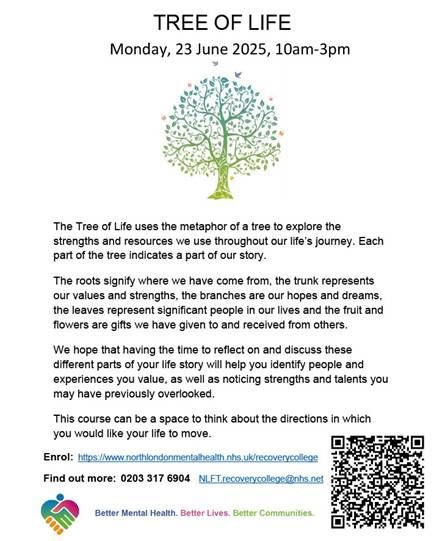
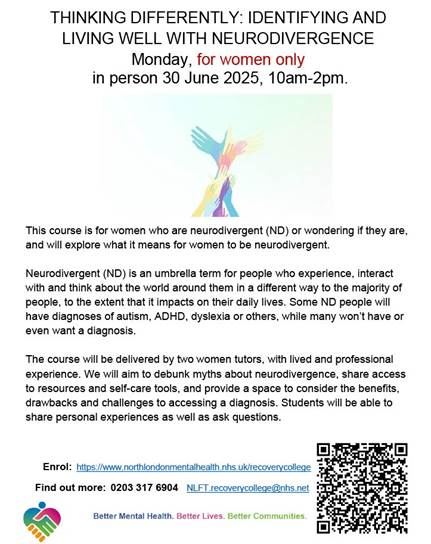
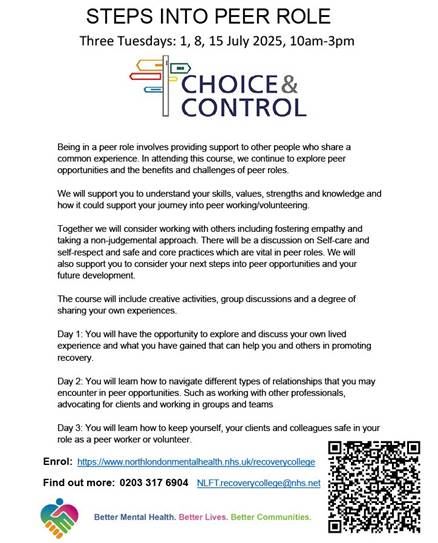
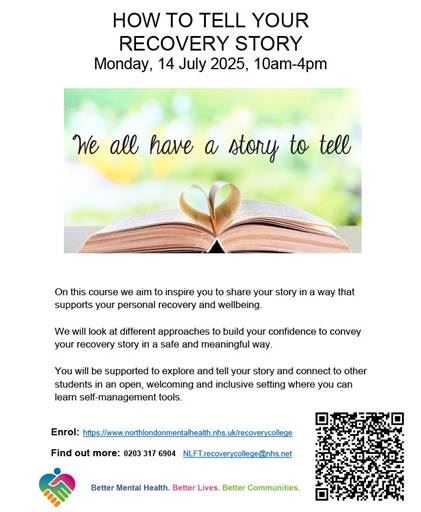
Alcohol Awareness Week - 7th-13th July 2025
This year’s Alcohol Awareness Week takes place from 7th to 13th July.
Around 10 million people in the UK regularly drink alcohol in ways that can harm our health and wellbeing. Alcohol can affect the human body in many ways, not limited to:
- Headaches
- Hangovers
- Sleepless nights
- Anxiety and depression
Regularly drinking more than 14 units of alcohol a week is considered as posing a risk of damaging your health.
Longer hours, more stress, the blurring of lines between work and home, and too many workplace cultures that place drinking rather than people at the centre of things, lead to alcohol and work being linked in many ways. How many of us have likely not stopped to think about the impact of the work we do on our risk from alcohol?
The theme for Alcohol Awareness Week this year is Alcohol and Work. As part of the week, Alcohol Change UK be looking to open conversation about the relationship between alcohol and work to help us better understand it and will be sharing some helpful tips and advice on changes we can make to improve things for everyone.
If you are needing support with your drinking, click the link to find out about your options: https://alcoholchange.org.uk/help-and-support/get-help-now
Samaritans Awareness Day - 24th July 2025
Samaritans Awareness Day is on 24 July. Every year Samaritans branches in the UK and Ireland hold local events to raise awareness that Samaritans are here to listen to anyone who's struggling to cope, at any time of the day or night.
Samaritans are a UK-based charity providing emotional support to anyone about anything that’s troubling them, no matter how large or small the issue feels. They offer a non-judgmental and confidential service.
Samaritans have a variety of contact methods:
- Phone (free): 116 123
- Email: jo@samaritans.org
- Write-in to: Freepost SAMARITANS LETTERS
- Face-to-face: Please check details of Central London branch
All methods of contacting Samaritans are completely free and open to all ages.
Find out more about our local Samaritans branch here: https://www.samaritans.org/branches/central-london/
World Hepatitis Day - 28th July 2025
World Hepatitis Day, observed on 28th July, raises awareness of viral hepatitis, an inflammation of the liver that causes severe liver disease and cancer.
There are 5 main strains of the hepatitis virus – A, B, C, D, and E. Together, hepatitis B and C are the most common infections and result in 1.3 million deaths worldwide, and 2.2 million new infections per year.
World Hepatitis Day is an opportunity to step up national and international efforts on hepatitis, encourage actions and engagement by individuals, partners and the public and highlight the need for a greater global response as outlined in the WHO's Global hepatitis report of 2017.
The date of 28th July was chosen because it is the birthday of Nobel-prize winning scientist Dr Baruch Blumberg, who discovered hepatitis B virus (HBV) and developed a diagnostic test and vaccine for the virus.
Low coverage of testing and treatment is the most important gap to be addressed in order to achieve global elimination goals by 2030.
Please click here to find out more about hepatitis vaccinations.
Caring for Carers Event - 11th June 2025
Join us, Islington Carers Hub, and Camden & Islington Young Carers Service to find out about the support available in your local area.
Come along to discover local support and wellbeing services and connect with others. Whether you’re popping in for a chat or staying for the whole session, we’d love to see you there!
There will be free refreshments on-site during the event.
Date: Wednesday 11th June 2025
Time: 12:30 – 15:00
Where: St John’s Way Medical Centre, 96 St John’s Way, Archway, London, N19 3RN
Islington Dementia Fair - 22nd May 2025
Are you worried that someone close to you has signs of memory loss? Or do you want to find out more about dementia support and dementia-friendly activities in Islington?
If you want to learn more about what support is available for people living with dementia in Islington, this is the fair for you.
Click this link to sign up for the event: Sign up

Learning Disability Week - 16th-20th June
Learning Disability Week is happening this year between 16th and 20th June. This week, arranged by Mencap, aims to highlight the lived experience of people with learning disabilities. Mencap advocates for improving the quality of life for individuals with learning disabilities, raising awareness, and fighting stigma and discrimination.
Around 1.5 million people in the UK have a learning disability, defined as “a reduced intellectual ability and difficulty with everyday activities”.
Mencap report the average life expectancy of someone with a learning disability is 63 years old, compared to 86 for women and 82 for men in the general population.
The theme for this year’s Learning Disability Week is “Do you see me?” and looks to ensure that people with learning disabilities are seen, heard, and included.
You can find out more about how to get involved here.
Help available in General Practice:
Annual Health Check
GP practices keep a register of all patients with learning disabilities. Every year these patients are invited for an Annual Health Check, making sure that doctors and nurses at the surgery are familiar with each patient, and are up to date with their current situation and needs.
Reasonable Adjustments
Reasonable adjustments are considerations made to prevent patients from becoming disadvantaged. Below are some common examples of how your GP practice might try to help you:
- Easy-read format letters
- Increased appointment lengths, or suitable appointment times
- Accessibility tools on practice websites
- Seeing the same clinicians where possible.
Often these adjustments will be noted at the above-mentioned Annual Health Check, to make sure that the surgery can communicate with you effectively.
Cervical Screening Awareness Week - 19th-24th June
Cervical Screening Awareness Week is happening this year from 19th to 24th June. The week aims to highlight the importance of regular cervical screening for women’s health.
Two women per day die in the UK from cervical cancer – it is the most common form of cancer in women under the age of 35.
Regular cervical screening can prevent up to 75% of instances of cervical cancer. Despite this, many women are reluctant to have the test done, with one in four women not responding to their cervical screening invitation.
The screening process checks for a virus called high-risk HPV, which causes almost all cervical cancers. This is the best way to find out who is at higher risk of developing cervical cell changes that over time could lead to cervical cancer. Any cervical cell changes can be treated, preventing cervical cancer.
The aim of this awareness week is to encourage uptake of cervical screening, as well as provide information and reassurance to women about the test.
For more information about cervical screening, please click here.
National Clean Air Day
National Clean Air Day is an annual campaign organised by Global Action Plan and happens on the third Thursday in June – this year it is taking place on 19th June.
Air pollution is one of the most significant environmental health risks facing people today, especially in towns and cities. Air pollution can cause a number of health issues in children, for example heart and lung diseases, deficient lung development or low birth weight. It has also been found to contribute to mental health issues. Air pollution causes up to 36,000 deaths in the UK annually.
National Clear Air Day aims to:
- Improve public understanding of air pollution, both indoors and outdoors.
- Build awareness of how air pollution affects our health.
- Explain some of the easy things we can all do to tackle air pollution.
On National Clean Air Day, a simple action you could take to support the cause might be to use public transport, or a bicycle, rather than travel by car.
Volunteers' Week - 2nd-8th June
Volunteers’ Week is a yearly national campaign to recognise and celebrate the contribution of volunteers. This year it is being held between Monday 2nd June and Sunday 8th June. The initiative has been running for over forty years, providing an opportunity to thank current and past volunteers.
Volunteers play a very important role in the NHS – there are some 2 million people who volunteer each year with the NHS, and most NHS organisations participate in Volunteers’ Week celebrations to show their appreciation.
Islington has a strong voluntary sector, and community organisations help to make a big difference across the borough. You can find out more about volunteering opportunities in the borough by following this link to Voluntary Action Islington,
Islington Council also has a number of resources available for you to explore volunteering opportunities in the borough. You can find out more here.
Men's Health Week - 9th-15th June
Men’s Health Week takes place every year during the week leading up to Father’s Day, happening this year from 9th – 15th June. The focus is on raising awareness about the health challenges men face and encouraging them to prioritise their well-being.
Organised by the Men’ Health Forum, Men’s Health Week highlights the importance of addressing physical and mental health problems, reducing stigma and promoting regular health check-ups.
It is recognised that many men are often reluctant to seek medical advice, as such Men’s Health Week aims to provide space for conversation around men’s health and wellbeing.
Below are some statistics that emphasise why Men’s Health Week is important:
- One in five men dies before the age of 65 (Men’s Health Forum).
- Four in five suicides are by men, with suicide noted as the biggest cause of death for men under 35 (UK Parliament).
- According to the BUPA Wellbeing Index:
- 50% of men have struggled with mental health difficulties at some point, yet fewer than half have sought medical advice.
- 37% of UK men admit actively hiding their mental health issues from their partners.
- 30% of men surveyed said they didn’t know where to turn for advice or support.
Help Improve Mental Health Support and Prevention in Islington
What if everyone in Islington could get the mental health help they need, quickly and close to home. Tailored to their unique experiences? That’s what we’re working towards with this project.
Mental health problems are becoming more common, and many people are struggling to get the right support early enough. Early intervention and prevention means helping people before their problems get worse. This can involve reducing stress in someone’s life, supporting their family, connecting to the right services or building strong communities.
Islington is already doing great work. We have strong local charities, community hubs, and partnerships like the Bright Lives Alliance. But we know we can do more to make services simpler, more joined-up, and easier to access for everyone.
That’s why Islington Council is bringing together residents, service users, charities, and experts to design a better mental health support system. Over the next few months, they will run workshops, surveys, and drop-in sessions to hear from as many people as possible, and try to answer the following questions:
- What does early mental health support mean to you?
- What's working well, and what needs to improve?
- How can we better support people from different backgrounds?
The work is being done with Islington Mind, community leaders, and an independent expert to ensure that the process is fair and inclusive. They’ll help to gather ideas, tackle challenges, and find new solutions together.
This isn’t just about improving services—it’s about building a healthier, more connected Islington where everyone can thrive.
Be part of this Co-design project and help us make mental health support better for everyone.
For more information, please click the link below:
Co-designing mental health support in Islington
Teddy Bear’s Vaccination Adventure
The North Central London Prevention and Vaccinations team has launched a short friendly film Teddy Bear’s Vaccination Adventure to encourage more families to book appointments with confidence.
Teddy Bear’s Vaccination Adventure has been created to promote a positive vaccination experience for those in north central London requiring childhood immunisations.
Viewers can follow Teddy and his young carer as they arrive at a GP practice, meet the polite and helpful receptionist and get welcomed in by the nurse who puts them both at ease as she gives Teddy a vaccine. Teddy gets a sticker for being very brave and the video ends with all smiles.
The film should help children, and their parents/carers understand what happens during an immunisation appointment, reassuring them about the procedure.
Dementia Awareness Week - 19th - 25th May 2025
There are more than 900,000 people in the UK living with dementia. 1 in 11 people over the age of 65 have dementia in the UK.
Dementia Awareness Week this year will take place from 19th - 25th May 2025. The campaign is run by Alzheimer’s Society, with the aim of encouraging people and organisations across the UK to act on dementia, and to raise awareness of the importance of timely and accurate diagnosis.
This year’s focus will be on diagnosis of dementia, and the prioritisation of dementia in policy and decision making throughout the NHS and Government.
What is Dementia?
Dementia is a syndrome associated with an ongoing decline of brain functioning. There are many different causes of dementia, and many different types.
Alzheimer's disease is the most common type of dementia and, together with vascular dementia, makes up the majority of cases.
Dementia is a progressive disease, however, many people living with dementia lead active lives for many years.
Many factors can increase a person’s risk of developing dementia, including but not limited to:
- Ageing
- Genes
- Lifestyle (physical activity, diet, smoking, alcohol intake)
The majority of people with dementia are over 65, but dementia can also affect younger people.
What are the symptoms?
Dementia affects everyone in different ways. Below are some of the most common symptoms:
- Memory loss
- Difficulty thinking things through and planning
- Problems with language
- Being confused about time or place
- Visual-perceptual difficulties
- Mood changes or difficulties controlling emotions
Further information
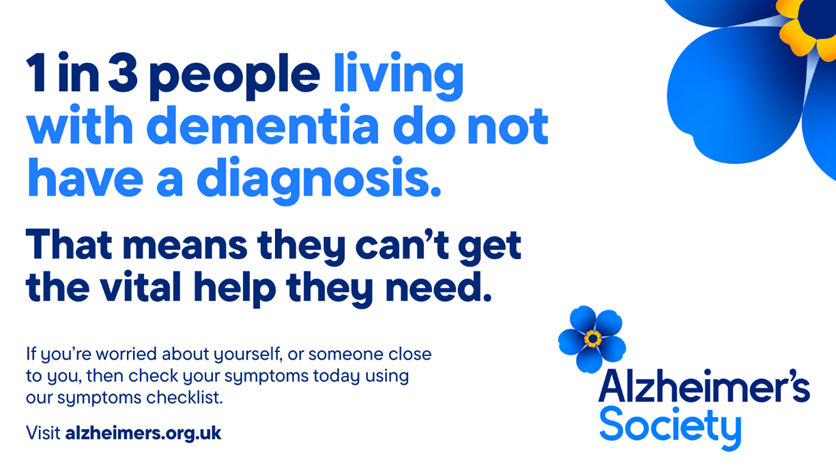
Mental Health Awareness Week - 12th May - 18th May 2025
Mental Health Awareness Week will take place this year between 12th and 18th of May.
The aim of the event, organised by the Mental Health Foundation, is to raise awareness of mental health, and promote mental wellbeing, through reflection, conversation and support for those experiencing mental health challenges.
The theme for 2025 has been defined as ‘Community’, highlighting the importance of having a positive community and its effect on mental health and wellbeing. Communities can provide us with emotional support, companionship, and a sense of belonging that reduces isolation.
Why is Mental Health Awareness Week Important?
Approximately 1 in 4 people in England will experience a mental health issue at some point in their lives. Mental Health Awareness Week aims to provide a space to encourage conversations about mental health and reduce the perceived stigma around the subject. It also gives a chance for organisations to advocate for better mental health support.
Who can I contact if me or someone I know is suffering from mental health problems?
There are a wide range of mental health services available in Islington. Please click here to see the Directory of Services.
International Nurses Day - 12th May 2025
International Nurses Day (IND) is a campaign run by the International Council of Nurses (ICN), and is celebrated every year on the 12th May, the anniversary of Florence Nightingale’s birth.
The theme for 2025 is focussed on the health and wellbeing of nurses, building on the 2024 IND’s work to demonstrate the societal and economic benefits of investment in nursing. The International Council of Nurses hope to promote the thinking that a healthy nursing workforce leads to better health outcomes for communities and improved functioning of health systems.
The role of Nurses in General Practice:
Nurses play an essential role in Primary care, undertaking an ever wider range of roles, including:
- Treating minor illnesses
- Helping people manage long term conditions
- Dressings
- Health screening and advice
- Family planning
- Running vaccination programmes (e.g. against flu)
- Running programmes to help people stop smoking
- Collecting blood samples
- Cervical screening
Nurses assess and treat people of all ages and work together with other members of the clinical team, including GPs, to ensure that health conditions are appropriately managed, and patients receive the best outcome from their visit to the practice.
World Asthma Day - 6th May 2025
World Asthma Day 2025 will take place on 6th May. The event, organised by the Global Initiative for Asthma (GINA), is held every year in May to raise awareness of asthma worldwide.
This year GINA is calling on healthcare professionals globally to ensure that asthma patients can access inhaled medications that are essential both for controlling the underlying disease and treating attacks.
Currently over five million people in the UK are receiving treatment for asthma – 4.3 million adults (1 in 12) and 1.1 million children (1 in 11). In the majority of cases, asthma can be controlled well most of the time, though some people do experience more persistent problems.
Occasionally, asthma symptoms can get gradually or suddenly worse. This is known as an “asthma attack”, although doctors sometimes use the term “exacerbation”. Severe attacks may require hospital treatment and can be life threatening, although this is unusual.
When to see a GP
If you think that you, or your child, may have asthma, it is advised that you see your GP. Many conditions have similar symptoms, so it is important to get a proper diagnosis and correct treatment.
Symptoms of asthma include:
- wheezing (a whistling sound when breathing)
- breathlessness
- a tight chest – it may feel like a band is tightening around it
- coughing
Many things can cause these symptoms, but they're more likely to be asthma if they:
- happen often and keep coming back
- are worse at night and early in the morning
- seem to happen in response to an asthma trigger like exercise or an allergy (such as to pollen or animals)
You can find out more information about asthma diagnosis here.
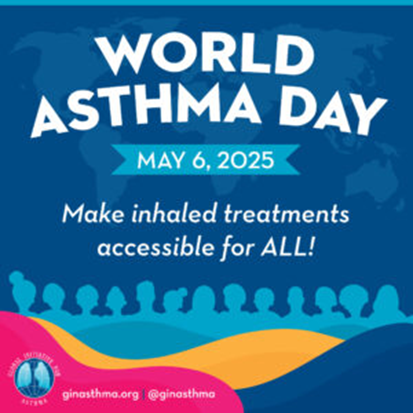
National Walking Month
National Walking Month occurs every year for the month of May. The campaign encourages people to walk more, with a number of national and local initiatives organised to promote walking and its physical and mental health benefits.
Walking is an easy exercise, for which you only need a pair of shoes. There are many ways to fit walking into your day; some ideas to get you started are listed below:
- Walk to school or work: Consider walking to and from work or school, or even part of the way.
- Take the stairs: Choose stairs over lifts or escalators.
- Explore your local area: Discover new places and enjoy the outdoors.
- Join walking challenges: Participate in walking challenges organised by local organisations.
- Share your walking adventures: Share your favourite walking routes and photos on social media using #NationalWalkingMonth.
Incorporating more walking into your daily routine can help to improve your health, as well as work to combat loneliness and isolation.
You can find out more information about National Walking Month here: National Walking Month
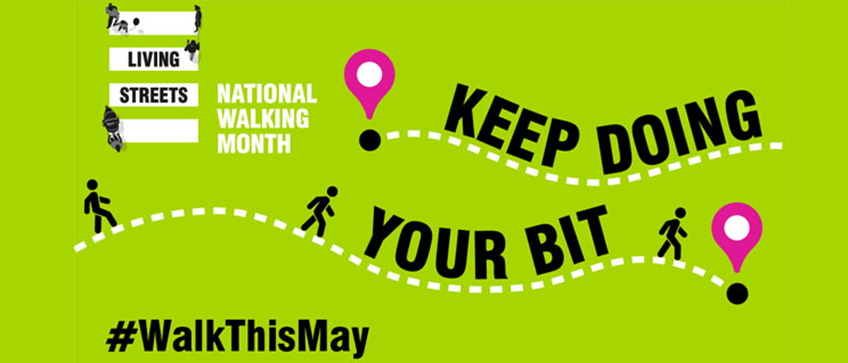
Bowel Cancer Awareness Month
What is Bowel Cancer Awareness Month?
Bowel Cancer Awareness Month is an annual event held every April to raise awareness about bowel cancer, educate the public on the importance of early detection, and provide support for those affected by the disease. This month is dedicated to spreading vital information about prevention, symptoms, screening, and treatment options for bowel cancer. By coming together during this time, we can encourage people to take charge of their health and increase the chances of successful outcomes through early diagnosis.
Why is it Important?
Bowel cancer, which includes colon and rectal cancers, is one of the most common types of cancer in the UK. It affects both men and women and is primarily diagnosed in those over 60, although it can also impact younger individuals. Early detection significantly improves survival rates, yet many people may not be aware of the symptoms or may be hesitant to seek medical advice.
Bowel Cancer Awareness Month serves as an opportunity to educate the public about how lifestyle choices, regular screenings, and recognising potential warning signs can help reduce the risk of bowel cancer.
Key Facts About Bowel Cancer:
- Bowel cancer is the third most common cancer in the UK.
- Over 40,000 new cases are diagnosed annually in the UK.
- It is more common in people aged 60 and older, but younger individuals are also at risk.
- Lifestyle factors such as diet, lack of exercise, smoking, and excessive alcohol consumption can increase the risk.
- If detected early, the survival rate for bowel cancer is significantly higher.
Key Symptoms of Bowel Cancer:
It’s crucial to recognise the warning signs of bowel cancer. These may include:
- Persistent changes in bowel habits (e.g., diarrhea, constipation, or a feeling of incomplete evacuation)
- Blood in your stool, or rectal bleeding
- Unexplained weight loss or fatigue
- Abdominal pain or discomfort
- A lump in the abdomen or pelvis
If you experience any of these symptoms, it’s essential to consult your GP for further investigation. Early detection can significantly increase the chances of successful treatment.
Screening for Bowel Cancer:
In the UK, bowel cancer screening is offered to individuals between the ages of 60 and 74. Screening involves taking a stool sample, which is then tested for signs of blood that may indicate the presence of cancer. If you are eligible for screening, it’s important to participate, as it can detect cancer early when treatment is most effective.
If you’re outside the screening age range, speak to your GP if you have concerns or a family history of bowel cancer.
Support for Those Affected:
Bowel Cancer Awareness Month also focuses on providing support to those diagnosed with the disease. Many organisations offer resources for patients, family members, and caregivers, including:
- Emotional support services
- Information on treatment options
- Advice on managing symptoms and side effects
- Ways to connect with others who are going through similar experiences
If you or someone you know is living with bowel cancer, reach out to support groups, healthcare providers, and charities that can provide invaluable assistance.
Key Organisations to Follow:
- Bowel Cancer UK – A leading charity providing information, support, and funding for bowel cancer research.
- Macmillan Cancer Support – Offers support for anyone affected by cancer, including those with bowel cancer.
- Cancer Research UK – Provides up-to-date information on bowel cancer and ongoing research into treatments and prevention.
Remember, early detection saves lives!
For more information, visit Bowel Cancer UK or Macmillan Cancer Support.
Stress Awareness Month
Stress Awareness Month is observed every April to raise awareness about stress, its causes, its impact on health, and ways to manage and reduce it. This month-long campaign aims to educate the public on how stress can affect various aspects of our lives and promote healthier coping mechanisms.
What is Stress?
Stress is the body’s natural response to demands or challenges. When you encounter a situation that requires you to react, whether it's personal, professional, or physical, your body triggers the “fight or flight” response, releasing hormones like adrenaline and cortisol. While this can be helpful in short bursts, chronic stress can have detrimental effects on mental and physical health.
The Impact of Stress
Stress can manifest in a variety of ways, both physically and emotionally. Some common effects include:
Physical Effects:
- Headaches or migraines
- Muscle tension or pain
- Fatigue
- Sleep problems (insomnia or excessive sleep)
- Heart problems (elevated heart rate, high blood pressure)
- Digestive issues (nausea, irritable bowel syndrome)
Emotional and Mental Effects:
- Anxiety or nervousness
- Depression
- Irritability
- Difficulty concentrating
- Feelings of helplessness
Causes of Stress
Stress can come from various sources in life, including:
- Work-related pressure: Deadlines, performance expectations, and job insecurity.
- Personal life challenges: Relationship issues, financial troubles, or health concerns.
- External factors: Environmental stressors such as traffic, noise, or global events.
- Health conditions: Managing chronic illness or dealing with medical concerns.
Why Stress Awareness Month Matters
While some stress is inevitable, the key is recognising when it becomes overwhelming and learning how to manage it. During Stress Awareness Month, the goal is to help individuals identify their stress triggers, understand how stress affects their well-being, and promote healthier coping mechanisms. Awareness campaigns also seek to reduce the stigma surrounding mental health and encourage people to seek help when needed.
How to Manage Stress
Effective stress management involves a combination of lifestyle changes, relaxation techniques, and seeking professional support. Here are some tips for reducing stress:
- Practice Mindfulness and Meditation
Mindfulness, breathing exercises, and meditation can help you stay grounded and calm during stressful moments. These techniques reduce anxiety and improve mental clarity.
- Stay Active
Exercise releases endorphins, the body’s natural stress-relievers. Even a daily walk can help reduce the tension caused by stress.
- Get Enough Sleep
Lack of sleep can exacerbate stress. Aim for 7-9 hours of quality sleep each night to help your body and mind recharge.
- Maintain a Healthy Diet
Eating a balanced diet can have a positive impact on your stress levels. Foods rich in omega-3 fatty acids, vitamins, and minerals can help regulate mood and energy levels.
- Connect with Others
Social support is crucial when managing stress. Talk to friends, family, or a therapist about what’s bothering you. Sometimes, just sharing your feelings can help alleviate stress.
- Set Boundaries
Learn to say no and prioritise your responsibilities. Avoid overcommitting yourself and set healthy boundaries to prevent burnout.
- Seek Professional Help
If stress becomes overwhelming, seeking support from a mental health professional such as a therapist or counsellor can provide you with strategies for coping and reducing stress in a healthy way. Please contact your GP if you have any questions.
- such as yoga, journaling, or taking breaks throughout the day.
For more information on stress management resources or upcoming events, visit Stress Awareness Month Official Website.
World Health Day
What is World Health Day?
World Health Day is an annual global event celebrated on April 7th to raise awareness about important health issues that impact people worldwide. The event was established by the World Health Organisation (WHO) in 1948 to commemorate its founding and highlight significant health challenges, promote healthier living, and advocate for global health initiatives.
Theme for 2025: "Health for All: A Global Commitment"
The theme for World Health Day 2025, "Health for All: A Global Commitment," emphasises the importance of universal health coverage. This theme calls for:
- Access to Health Services: Ensuring that everyone, regardless of their socioeconomic background, has access to essential healthcare.
- Improved Quality of Care: Advocating for high-quality, affordable healthcare services that are accessible to all.
- Global Health Equity: Tackling health disparities and working toward equal health outcomes across all regions and populations.
In 2025, the WHO will focus on strengthening health systems worldwide, ensuring that no one is left behind in terms of health access, and encouraging governments and organisations to make a firm commitment to improving the health of all people.
Global Health Issues to Highlight
- Mental Health: Mental health has become a critical concern worldwide, with many individuals lacking access to the necessary resources and care. World Health Day 2025 will aim to raise awareness about mental health services and create supportive environments for mental well-being.
- Non-Communicable Diseases (NCDs): Diseases such as heart disease, diabetes, and cancer are on the rise globally. Prevention and access to affordable treatment are key focal points for this year's campaign.
- Infectious Diseases: While COVID-19 remains a significant challenge, other infectious diseases like tuberculosis, HIV/AIDS, and malaria still affect millions. The campaign will emphasise the importance of prevention, treatment, and vaccination.
- Health Systems Strengthening: Universal Health Coverage (UHC) is an essential component of WHO's vision. Strengthening health systems and improving infrastructure to provide equitable access to health services is vital.
World Immunisation Week – 24th – 30th April
World Immunisation Week takes place every year in the last week of April to raise awareness about the importance of immunisation in preventing diseases.This global health initiative is an opportunity to educate communities on the importance of staying up to date with vaccinations and the role they play in protecting individuals and society from preventable diseases.
Why Immunisation Matters for You and Your Family
Immunisation is one of the most effective ways to protect against a range of serious diseases, many of which can cause long-term health problems or even death. In the UK, vaccines help protect against diseases such as measles, mumps, rubella, and flu, and they are a cornerstone of our national health policy.
- Protection for Children and Adults: Immunisation isn’t just for children; adults also need to stay up to date with vaccinations like the flu vaccine, shingles vaccine, and COVID-19 boosters.
- Herd Immunity: High immunisation rates help create herd immunity, which protects those who cannot be vaccinated, such as infants, the elderly, and those with certain medical conditions.
- Preventing Outbreaks: Ensuring you and your family are vaccinated helps prevent outbreaks of diseases that were previously under control, like the measles outbreak in Europe.
What Vaccines Are Available in the UK?
In the UK, a comprehensive vaccination schedule is offered, which includes vaccines for:
- Children: Routine vaccinations include those for diseases such as diphtheria, tetanus, whooping cough, polio, MMR (measles, mumps, rubella), and more.
- Flu Vaccine: Available for children, pregnant women, the elderly, and those with certain health conditions. It’s especially important during the winter months.
- Shingles Vaccine: For adults aged 70-79, this vaccine helps protect against shingles, a painful and often debilitating condition.
- COVID-19 Vaccine: Available for eligible groups, with booster doses recommended for those at higher risk.
- Travel Vaccines: If you're planning to travel, it’s important to check if you need additional vaccinations, such as hepatitis A, typhoid, or yellow fever.
Key Actions You Can Take During World Immunisation Week:
- Check Your Immunisation Status: Review your vaccination history to ensure you and your family are up to date. If you’re unsure, your GP can help you check.
- Book an Appointment: If you or your child are due for any vaccinations, make an appointment with your GP. This is especially important for flu and routine childhood vaccines.
- Spread Awareness: Share the importance of vaccination with family, friends, and social media networks. Raising awareness helps encourage others to protect their health too.
- Engage with Your GP: If you have any doubts or questions, don’t hesitate to ask your GP about the benefits of vaccination and how it protects you and your community.
How Vaccines Help Protect You and Your Community
- Protect Yourself and Your Family: Vaccines are a safe and effective way to prevent potentially severe or life-threatening illnesses.
- Prevent the Spread of Disease: By getting vaccinated, you contribute to the health of your entire community. If enough people are vaccinated, it can help stop the spread of diseases like measles, polio, and flu.
- Protect Vulnerable Groups: People who cannot be vaccinated due to medical conditions (such as infants or those with weakened immune systems) rely on the protection provided by others who are vaccinated. This is called "herd immunity."
Vaccination Myths vs. Facts
There are many misconceptions about vaccines, but they are safe and effective. Here are some common myths and the facts that dispel them:
- Myth: Vaccines can cause the diseases they’re supposed to protect against.
- Fact: Vaccines contain killed or weakened forms of a virus or bacteria, so they cannot cause the disease.
- Myth: The MMR vaccine (measles, mumps, rubella) causes autism.
- Fact: Extensive research has shown no link between the MMR vaccine and autism.
- Myth: Vaccines are unnecessary because the diseases they prevent are rare.
- Fact: While diseases like measles are less common in the UK, outbreaks can occur if vaccination rates drop. Vaccines have virtually eradicated many diseases, but we must maintain high vaccination rates to keep them controlled.
Key Facts About Vaccination in the UK
- Vaccines prevent around 2-3 million deaths worldwide each year.
- The UK’s childhood vaccination programme has led to the near-eradication of diseases like polio and diphtheria.
- The flu vaccine is available annually for free to those who are most vulnerable, including those over 65 and those with chronic health conditions.
- The MMR vaccine is given to children at 1 year and again at 3 years and 4 months to protect against measles, mumps, and rubella.
For more information, visit NHS Vaccination Information.
Young Carers Action Day
Young Carers Action Day is an annual event dedicated to raising awareness about young carers - children and young people who provide unpaid care and support to family members, often due to illness, disability, or other long-term conditions. The day aims to recognise the vital role these young individuals play, highlight the challenges they face, and promote the importance of providing them with the support they need.
The theme for Young Carers Action 2025 is ‘Give Me A Break”. Young carers carry a heavy load of responsibility, leaving them with little time for themselves and putting them at a high risk of burnout. They need a break. Research shows that young carers are much more likely to experience severe psychological distress compared to their peers without caring responsibilities. It's crucial for them to have time away from their caregiving duties to rest, recharge, and focus on themselves - whether that's pursuing a hobby or simply spending time with friends, just like others their age.
The ‘Give Me A Break’ theme also highlights the need for education professionals and employers to provide young carers with a break in life. This could involve offering additional support at school, acknowledging that their caregiving duties at home often leave them feeling overwhelmed as they try to balance these responsibilities with their schoolwork. By better understanding these pressures and offering assistance, education professionals can help young carers manage their challenges, giving them the opportunity to succeed both at school and in further and higher education.
If you are a young carer, please let your GP know so we can update our records.
Contact Carers Direct
- Telephone – 0808 802 0202
- Helpline Information – nhs.uk/carersdirect/carerslives/updates/pages/carersdirecthelpline.aspx
- Email – carersdirect@nhschoices.nhs.uk
- Office Hours – Lines are open 8am to 9pm Monday to Friday, 11am to 4pm at weekends. Calls are free from UK landlines.
- ISLINGTON CARERS HUB is there to help. Please call 0800 085 1141(FREEPHONE)
World Down Syndrome Day – 21st March 2025
upport is something we all require at times, with some needing it more than others, and that's perfectly okay. The same applies to individuals with Down syndrome.
Receiving the right support from the right people enables us to open up, creates opportunities, and empowers us to take control of our lives.
It’s also crucial for families to receive love and support from their peers, whether that be colleagues, family, or friends.
World Down Syndrome Day is an opportunity to celebrate these individuals in our lives and to inspire action, highlighting the importance of ensuring human rights.
Ovarian Cancer Awareness Month
Cancers of the ovary, fallopian tube, and peritoneum are frequently categorised together due to their similarities, and they are treated in the same manner.
Ovarian cancer can affect anyone with ovaries and fallopian tubes, including women, transgender men, and individuals assigned female at birth.
5 important things we all need to know:
- Ovarian cancer is not a silent disease – there are key symptoms that are persistent and often occur from the start, which may indicate you have the condition. These symptoms include bloating, abdominal pain, frequent urination, and feeling full quickly.
- Cervical screening does not detect ovarian cancer. While it’s important to attend your cervical screening when invited, be aware that it does not identify ovarian cancer. Familiarize yourself with the symptoms of ovarian cancer, and if you're concerned, consult your GP.
- Ovarian cancer can affect anyone, regardless of age, but post-menopausal women and those over 50 are at a higher risk.
- Even if you’ve had a hysterectomy, you can still develop ovarian cancer. If you still have your ovaries, you remain at risk. If you've had or still have ovaries and experience any of the above symptoms, see your GP.
- A family history of cancer is important to note. A common misconception is that hereditary ovarian cancer is only passed through the maternal line, but this is not true. You may be at higher risk if there are two or more cases of breast and/or ovarian cancer in your family history.
Diagnosis of Ovarian Cancer
Your GP will inquire about your symptoms and perform an internal vaginal examination to check for any lumps or swelling. They will typically arrange the following tests:
- A CA125 blood test to measure elevated levels of this protein, which may indicate ovarian cancer.
- Ultrasound scans to examine the organs in the pelvic and abdominal areas.
Please visit https://targetovariancancer.org.uk/ to learn more about Ovarian Cancer Awareness Month.
Nutrition and Hydration Week
This year, Nutrition and Hydration Week will take place from March 17th to 23rd, 2025. Its goal is to raise awareness and educate people about the importance of food and drink in supporting health and well-being.
The mission of Nutrition and Hydration Week is:
‘To create a global movement that will focus energy, activity and engagement on nutrition and hydration as a fundamental element of maintaining health and well-being for our global community.’
With tighter budget constraints making public health efforts more challenging, Nutrition and Hydration Week is one of the most cost-effective health interventions available.
Why is good nutrition and hydration important?
Malnutrition and dehydration are significant concerns in health and social care services and are more common than many realize.
Around 1 in 3 patients admitted to hospitals or care homes are either malnourished or at risk of becoming so.
These statistics are concerning, but what is even more alarming is the impact they have. Poor nutrition and dehydration can negatively affect patients' health and well-being, hinder their ability to recover from illness, and lead to longer hospital or care home stays. This, in turn, places additional strain on patients, healthcare providers, and the system.
Good nutrition and hydration are crucial not only for patients and service users but for everyone. We all benefit from nourishing our bodies with nutritious food and staying hydrated throughout the day.
Life can be busy, especially for those working in healthcare, and it’s often challenging to find time to prepare healthy meals and drink enough water.
Take this week as an opportunity to assess and improve the quality of nutrition and hydration provided to both healthcare patients and service users—and to yourself. This can help reduce avoidable hospital stays and improve overall health and well-being.
Visit the Nutrition and Hydration Week website to find out more.
World Kidney Day – 13th March 2025
World Kidney Day (WKD) is an annual global event dedicated to raising awareness about the importance of kidney health, the prevention of kidney disease, and the need for early detection and treatment.
The day aims to educate the public and policymakers about kidney health, kidney disease prevention, and the impact of kidney-related conditions on individuals and communities worldwide.
World Kidney Day also works to combat the rising global incidence of chronic kidney disease (CKD), which can be caused by factors such as diabetes, high blood pressure, and unhealthy lifestyle choices.
To reduce your risk of CKD, it's important to focus on healthy lifestyle choices and take precautions with certain medications. Here are some key steps you can take:
- Quit Smoking: Smoking can damage blood vessels and reduce blood flow to your kidneys, increasing the risk of CKD. Quitting smoking helps protect your kidneys and improves overall health.
- Reduce Alcohol Intake: Drinking excessive alcohol can lead to high blood pressure and liver damage, both of which can contribute to kidney disease. Moderating your alcohol intake helps protect your kidneys.
- 30 Minutes of Exercise a Day: Regular physical activity helps manage weight, reduces blood pressure, and improves heart health - all factors that can lower your risk of CKD. Aim for at least 30 minutes of moderate exercise most days of the week.
- Staying a Healthy Weight: Being overweight or obese can increase your risk of conditions like diabetes and high blood pressure, which in turn can lead to kidney damage. Maintaining a healthy weight through a balanced diet and regular exercise can reduce your risk.
- Be Cautious with Anti-inflammatory Drugs (e.g., Ibuprofen): Long-term or excessive use of non-steroidal anti-inflammatory drugs (NSAIDs), like ibuprofen, can damage the kidneys. These drugs should be used cautiously, especially in people with existing kidney problems or conditions like high blood pressure or diabetes.
In addition to these, it's important to regularly monitor kidney function if you have risk factors like diabetes, high blood pressure, or a family history of kidney disease. Early detection and treatment can help prevent CKD from progressing.
National No Smoking Day – 12th March 2025
National No Smoking Day is an ideal time to start your journey towards a healthier, smoke-free life. Quitting smoking is one of the best decisions for your health, and the positive effects begin right away:
✔️ Improved breathing – Your lungs begin to heal, making it easier to breathe.
✔️ Increased energy – Better oxygen levels enhance circulation.
✔️ Lower risk of disease – Reduces your chances of heart disease, stroke, and lung cancer.
✔️ Extra savings – Smokers spend thousands each year on cigarettes.
Breathe Stop Smoking Service is a free Camden & Islington service. Get the support that suits you best to stop smoking, including tips to stop by yourself, personalised help from a specialist advisor online or over the phone, and face-to-face support in Islington (and Camden) throughout your journey to be smoke free.
How to Get Support
📞 Call 020 3633 2609
📲 Text “QUIT” to 66777
💻 Visit Breathe – Stop Smoking Service
Shape Up Weight Management – April enrolment now open
We are pleased to announce that Arsenal’s next round of Shape Up weight management courses are now open for enrolment and begin in April. Arsenal are also running one further round of their Women’s Shape Up project.
You can self refer by contacting communityhealth@arsenal.co.uk. Alternatively, you can submit an online consultation and request a referral to the programme.
We encourage patients to watch Arsenal’s video to understand what the programme is: https://vimeo.com/856389052?share=copy

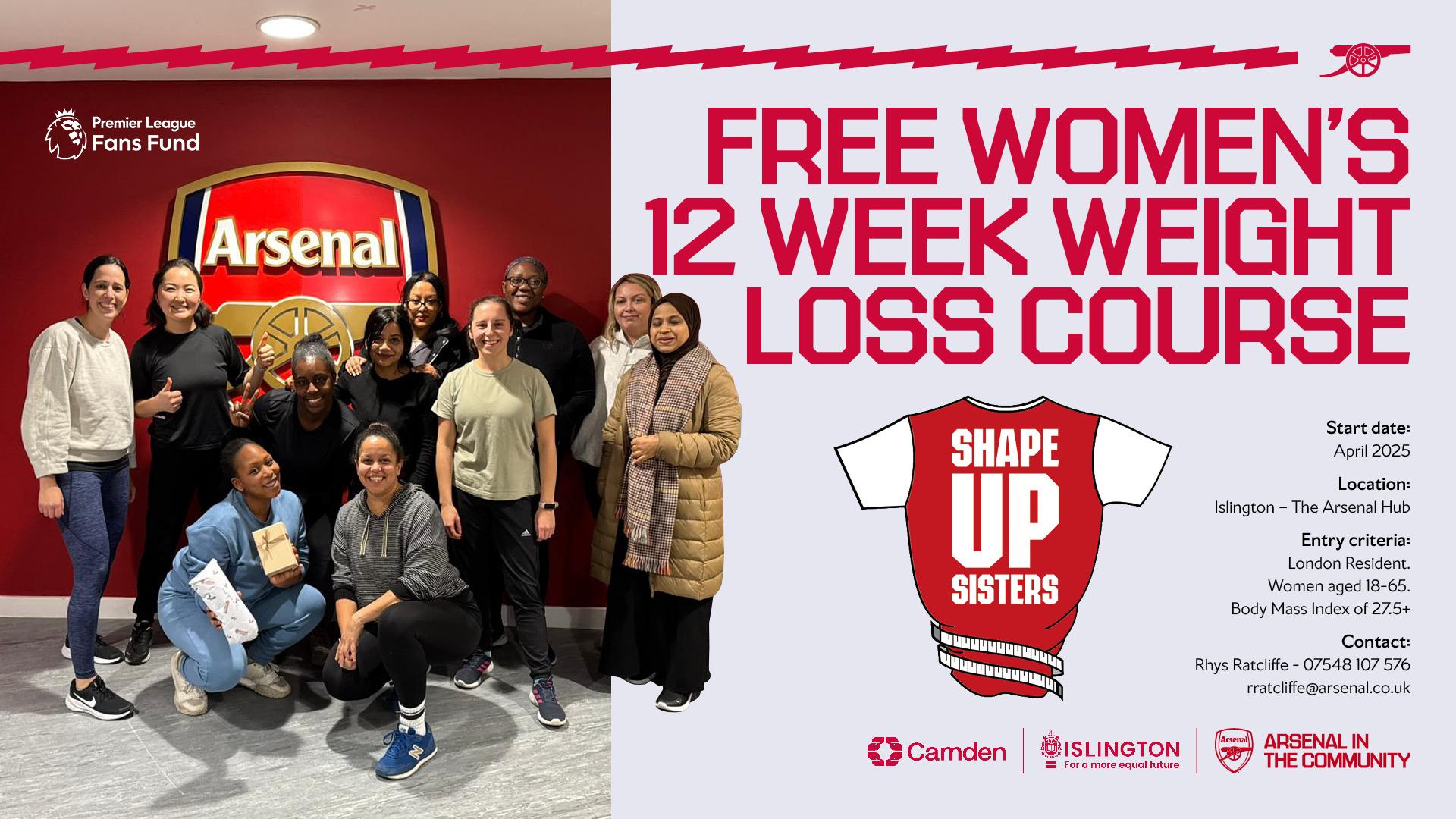
Cost of Living Event
World Cancer Day
World Cancer Day is observed globally every year on February 4th, bringing people together in the fight against cancer.
It’s an ideal occasion to raise awareness about cancer and share how we can all take steps to reduce the risk.
One important action we can take is to respond to NHS cancer screening invitations.
In England, there are three types of cancer screenings for adults that save thousands of lives each year: breast cancer screening, bowel cancer screening, and cervical screening.
To find out more about World Cancer Day, please visit the dedicated website.
National HIV Testing Week
National HIV Testing Week is an annual initiative by HIV Prevention England that highlights the importance of regular HIV testing. The campaign aims to reduce the number of undiagnosed HIV cases and those diagnosed late.
The UK government’s target is to eliminate HIV transmissions and HIV-related stigma by 2030. How can we make this happen?
Free HIV testing is simple and quick – just a finger-prick. Regular testing is essential because HIV can go undetected for years without symptoms. The only way to know your HIV status is to get tested. Early detection allows individuals to begin treatment, stay healthy, and prevent transmission to others.
You can visit the Sexual Health London website to order a free home testing kit.
You can also speak to our staff in your local sexual health service, or your GP.
Who should get tested?
- It’s recommended for everyone who is sexually active to get tested for HIV and other STIs at least once a year, even if there’s no obvious risk. If someone has multiple sexual partners, they should consider testing more frequently.
- Gay, bisexual, and other men who have sex with men (GBMSM) should get tested regularly for HIV and STIs, at least once a year, or every three months if having unprotected sex with new or casual partners.
- Black African men and women should have routine HIV and STI screenings if engaging in unprotected sex with new or casual partners.
- Trans men and trans women who have sex with men should test for HIV and other STIs regularly, either annually or every three months if having unprotected sex with new or casual partners.
How to protect yourself from HIV:
- The most effective ways to protect against HIV are using condoms and taking PrEP (pre-exposure prophylaxis). PrEP is a highly effective medication for those at risk of HIV, and when taken as directed, it helps prevent HIV transmission. For more information, click [here](opens link).
- PEP (post-exposure prophylaxis) is a treatment that can prevent HIV if taken within 72 hours after potential exposure to the virus. It’s available through sexual health services.
For registered patients at the practice, our local sexual health clinic is:
Archway Sexual Health Clinic
681-689 Holloway Road
Archway
London
N19 5SE
Eating Disorders Awareness Week
Eating Disorders Awareness Week is a national campaign led by Beat, the UK’s eating disorder charity. It focuses on encouraging UK medical schools to introduce comprehensive eating disorder training.
Eating disorders can develop for many complex reasons. They occur when a person has a negative relationship with food and their body, which seriously affects their life.
These disorders may involve overeating or undereating, with a strong preoccupation with weight and body image, causing significant distress.
Eating disorders can affect anyone, regardless of gender, age, ethnicity, sexuality, or background. The good news is that treatment is available, and it’s important to reach out for support and advice from Beat or a GP (you can submit an e-consultation).
Recovery is possible, though it’s a journey that looks different for everyone.
Worried about becoming homeless?
If you think you might lose your home, don't wait - reach out to the Housing Aid Team today. The sooner you contact us, the better chance we have to help you and prevent you from becoming homeless.
Great Mental Health Day
Great Mental Health Day is an annual event in the UK, typically observed on the last Friday of January. In 2025, for example, this would fall on Friday, January 31st. The day is part of the larger "Great Mental Health" campaign, which aims to raise awareness about mental health and promote positive mental well-being for everyone.
The goal of Great Mental Health Day is to encourage people to take action to improve their mental health, whether through self-care, connecting with others, or seeking support when needed. The day highlights the importance of mental health and encourages individuals, communities, and organizations to focus on mental well-being and engage in activities that promote it.
This day is especially important in light of the winter months, which can sometimes lead to seasonal affective disorder (SAD) and other mental health challenges. Activities and events on this day often include raising awareness about mental health resources, promoting positive conversations about mental health, and supporting individuals who may be struggling.
For more information, you can visit Thrive LDN.
Cervical Cancer Prevention Week
Cervical cancer claims the lives of 700 women annually in the UK, but this doesn’t have to be the case.
Cervical screening can detect the viruses that cause cervical cancer, and the NHS screening programme in England saves 5,000 lives each year.
The HPV vaccine also plays a crucial role in the fight against cervical cancer, offering significant protection against these harmful viruses.
Cervical Cancer Prevention Week, led by the charity Jo’s Trust and running until 28 January, aims to raise awareness of cervical screening and the HPV vaccine.
Anyone eligible for cervical screening is strongly encouraged to attend their potentially life-saving appointment.
The screening involves taking a small sample of cells from the cervix to check for high-risk human papillomavirus (HPV) that could lead to cervical cancer if untreated. People aged 25 to 64 who are eligible are invited every three to five years, or more frequently if HPV or abnormal cells are found.
Currently, a third of those invited for screening do not attend. If you’ve received an invitation but haven’t yet booked an appointment, contact your GP now.
For more information on cervical screening, visit the NHS website.
To learn more about Cervical Cancer Prevention Week, visit the Cancer Research UK website.
STiQ Day
STIQ Day has been launched to get people thinking about their sexual health and encourage more people to get regular sexual health checks. No one likes to think they’ve caught a sexually transmitted infection (STI) but without a test you just can’t be sure.
This year STIQ Day takes place on 14th January, a date chosen because many common STIs such as Chlamydia can take two weeks to be detectable. If your festive season included unprotected sex then you should be thinking about getting tested now. Also with just one month to go before Valentine’s Day anyone hoping to enjoy the celebrations to the full should do so knowing that they are infection free and will not be putting someone else’s sexual health in danger.
More and more people in the UK are catching STIs and each year the infection rate is rising. Regardless of how old you are, if you’re gay or straight, if you’ve had one partner or 100 – just one unprotected sexual encounter could have put you at risk of catching an STI.
Even if you feel perfectly healthy you could still be carrying something. Often getting routinely tested is the only way that people can detect an infection – and the earlier they are tested and treated, the less chance there is of long-term damage being caused.
Getting a sexual health check is easy and shouldn’t be embarrassing or shameful; sex is a normal part of adult life so sexual health checks should be to. It’s a quick, simple process that not only puts your mind at rest but could protect your fertility or even save your life – or that of your partner
So use STIQ Day to get smart about your sexual health
Do you want to get checked? You can do this at your local GUM clinic. The nearest GUM clinic to Partnership Primary Care Centre is:
Archway Sexual Health Clinic
681-689 Holloway Rd
Archway,
London
N19 5SE
Telephone: 020 3317 5252
Page created: 27 July 2021
